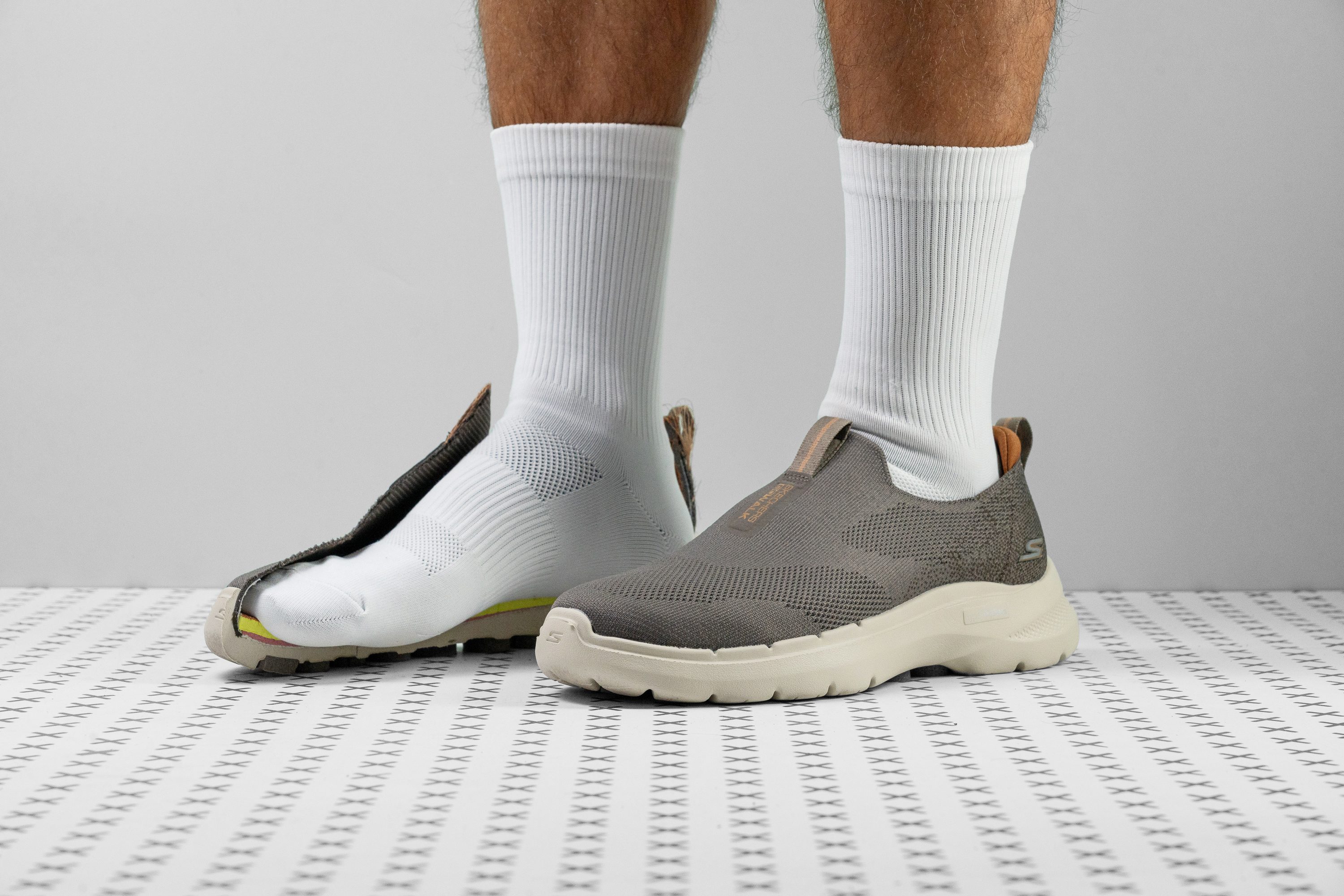Our verdict
- Top pick in best walking shoes for Europe
- Top pick in best Skechers walking shoes
Pros
- Pillow-like comfort
- Cushioned for all-day wear
- Amazingly lightweight
- Surprisingly durable upper
- Snug sock-like fit
- Easy on and off
- Super flexible
- Very affordable
Cons
- Not breathable
- Outsole lacks durability
Audience verdict
- Top 24% in slip-on walking shoes
- Top 22% in cushioned walking shoes
Comparison
The most similar walking shoes compared
+ + Add a shoe | |||||
|---|---|---|---|---|---|
| Audience score | 90 Great! | 89 Great! | 91 Great! | 90 Great! | |
| Price | £90 | £80 | £60 | £60 | |
| Arch support | Neutral | Neutral | Neutral | Neutral | |
| Shock absorption | Moderate | Moderate | Moderate | High | |
| Energy return | Moderate | High | Low | High | |
| Traction | High | High | High | High | |
| Orthotic friendly | ✓ | ✓ | ✓ | ✓ | |
| Weight lab Weight brand | 8.8 oz / 249g | 7.7 oz / 219g | 6.9 oz / 197g 8.1 oz / 230g | 6.2 oz / 175g | |
| Lightweight | ✓ | ✓ | ✓ | ✓ | |
| Breathability | Warm | Warm | Warm | Warm | |
| Use | EuropeRecovery | Europe | Europe | CityDisneyEurope | |
| Size | True to size | True to size | True to size | True to size | |
| Midsole softness | Balanced | Soft | Balanced | Soft | |
| Difference in midsole softness in cold | Small | Big | Normal | Big | |
| Insole thickness | Average | Average | Average | Average | |
| Removable insole | ✓ | ✓ | ✓ | ✓ | |
| Stiffness | Flexible | Flexible | Flexible | Flexible | |
| Torsional rigidity | Flexible | Flexible | Flexible | Flexible | |
| Heel counter stiffness | Flexible | Flexible | Flexible | Flexible | |
| Heel tab | Finger loop | Finger loop | Finger loop | Finger loop | |
| Drop lab | 13.3 mm | 9.0 mm | 15.8 mm | 9.5 mm | |
| Heel stack lab | 35.3 mm | 33.0 mm | 36.4 mm | 32.7 mm | |
| Forefoot | 22.0 mm | 24.0 mm | 20.6 mm | 23.2 mm | |
| Width / fit | Narrow | Narrow | Narrow | Narrow | |
| Toebox width | Narrow | Medium | Medium | Medium | |
| Closure | Slip-on | Slip-on | Slip-on | Slip-on | |
| Toebox durability | Good | Good | Decent | Decent | |
| Heel padding durability | Bad | Decent | Good | Decent | |
| Outsole durability | Bad | Bad | Bad | Bad | |
| Midsole width - forefoot | Average | Average | Average | Narrow | |
| Midsole width - heel | Average | Average | Average | Average | |
| Outsole hardness | Very soft | Soft | Very soft | Very soft | |
| Outsole thickness | |||||
| Tongue padding | Thin | Thin | Average | Thin | |
| Tongue: gusset type | Sock like | Sock like | Bootie | Sock like | |
| Memory foam | ✗ | ✗ | ✓ | ✗ | |
| Material | - | Mesh | Mesh | Mesh | |
| Ranking | #11 Top 31% | #20 Bottom 44% | #8 Top 23% | #12 Top 34% | |
| Popularity | #23 Bottom 36% | #19 Bottom 47% | #24 Bottom 33% | #17 Top 48% |
Who should buy
We believe that this walking shoe from Skechers is going to feel right at home if you are looking for the following:
- a cosy slip-on shoe that could be your daily go-to
- a very lightweight pair of shoes
- a comfort-loaded walking sneaker to keep you pain-free
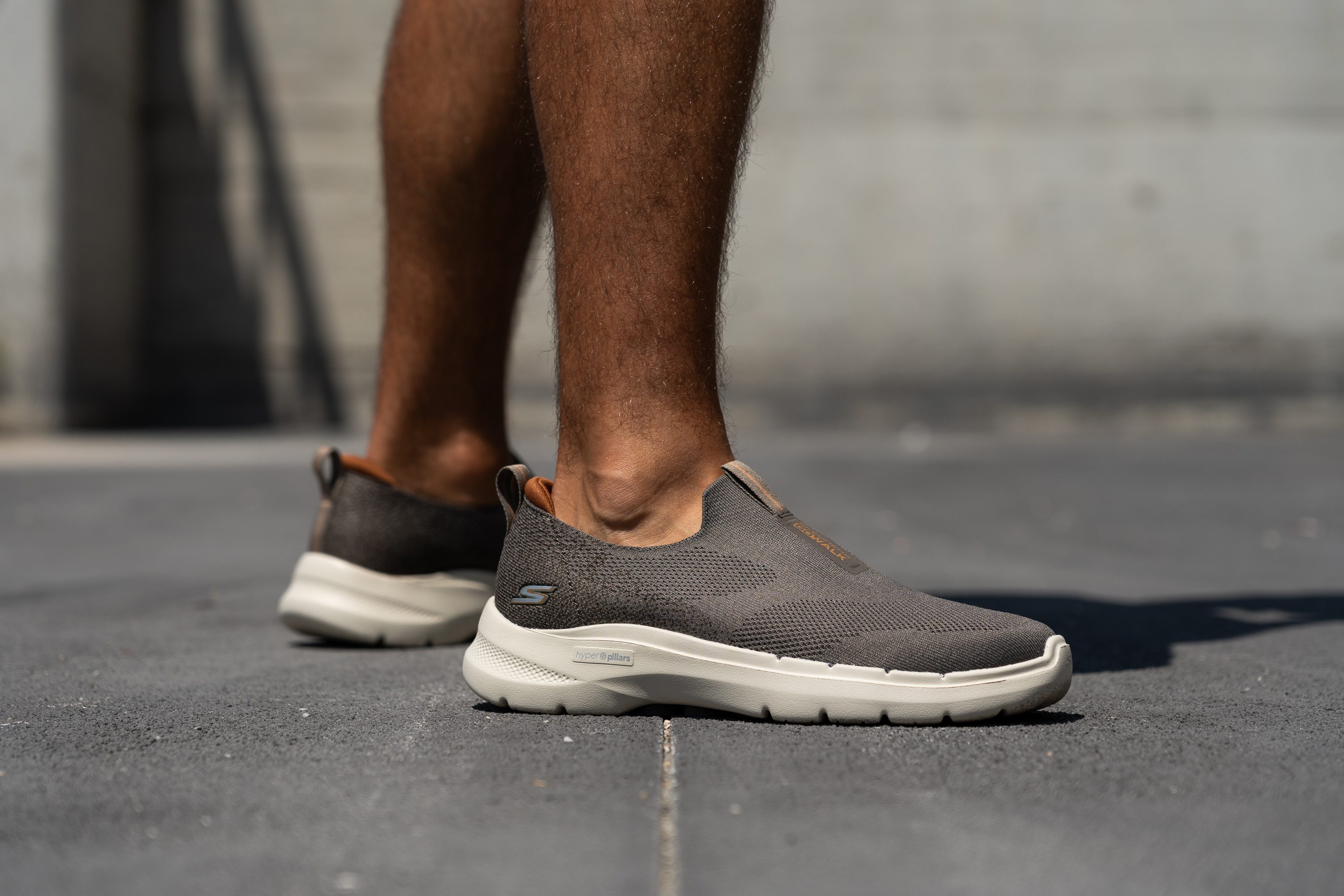
Who should NOT buy
People looking for arch support should stay away from the GOwalk 6. This extra soft and flexible shoe is the absolute opposite of structured support. We highly recommend Skechers Arch Fit instead.
The shoe's knit upper also lacks in the breathability department. If you need a well-ventilated summer shoe, have a look at the Allbirds Tree Runners instead.
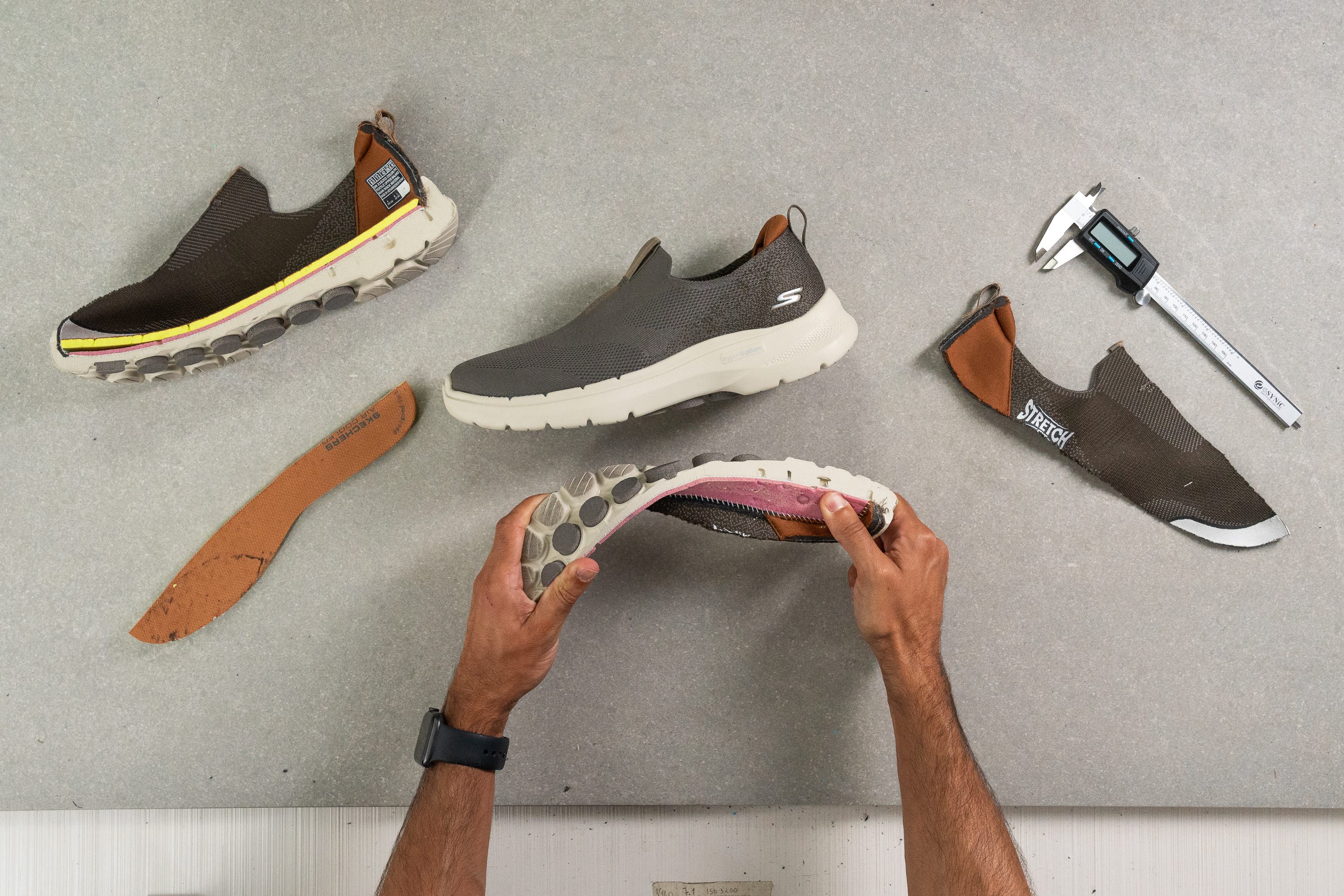
Cushioning
Shock absorption
With a solid shock absorption measurement of 109 SA, the Skechers GO WALK 6 makes a very comfortable daily beater. Plush and cushy, it creates a nice buffer between your foot and hard concrete pavement.
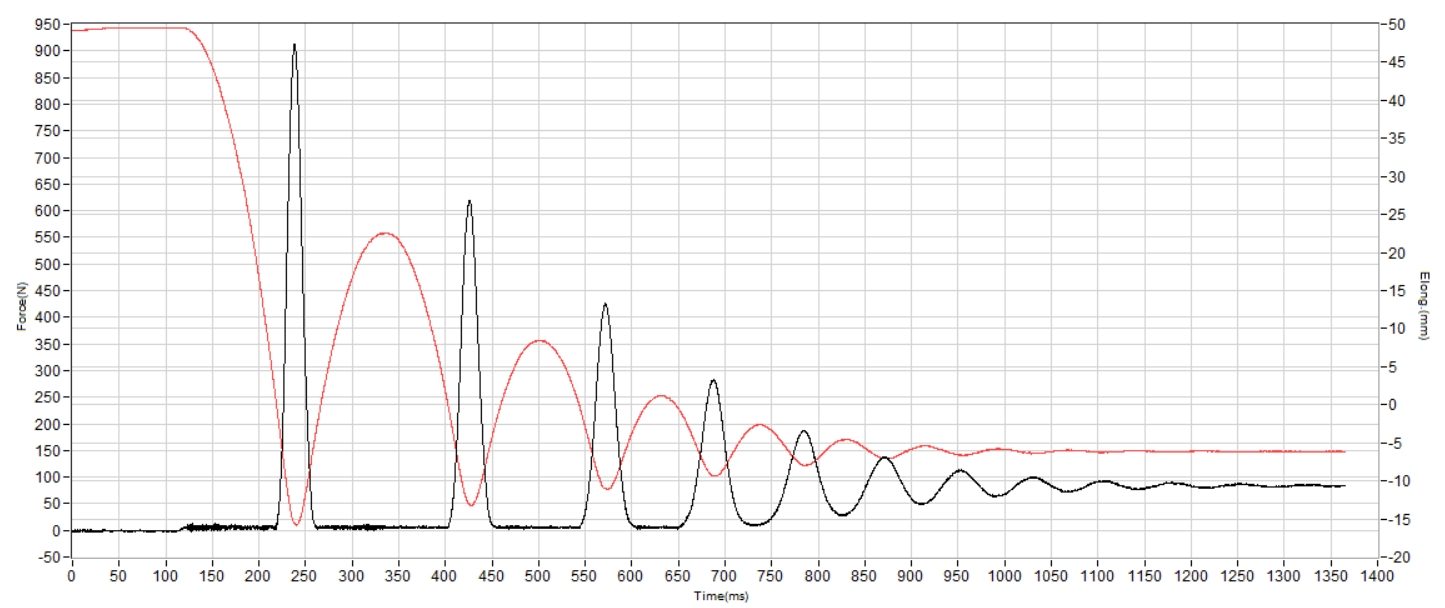
| GO WALK 6 | 109 SA |
| Average | 111 SA |
Energy return
This Skechers shoe also has a very nice bounce to it!
Measuring its energy return at 54.8%, we found that its midsole has a pleasant springback that keeps the ride dynamic and less tiring for the legs.
| GO WALK 6 | 54.8% |
| Average | 51.1% |
Heel stack
Believe it or not, but the GOwalk 6 has more cushioning than the average walking shoe!
Using a calliper to measure its stack height, we got 35.3 mm in the heel! This is 3.5 mm taller than average! All while being lighter than the average too. Very impressive.
No wonder this Skechers shoe felt so supportive for more than 8 hours on our feet.
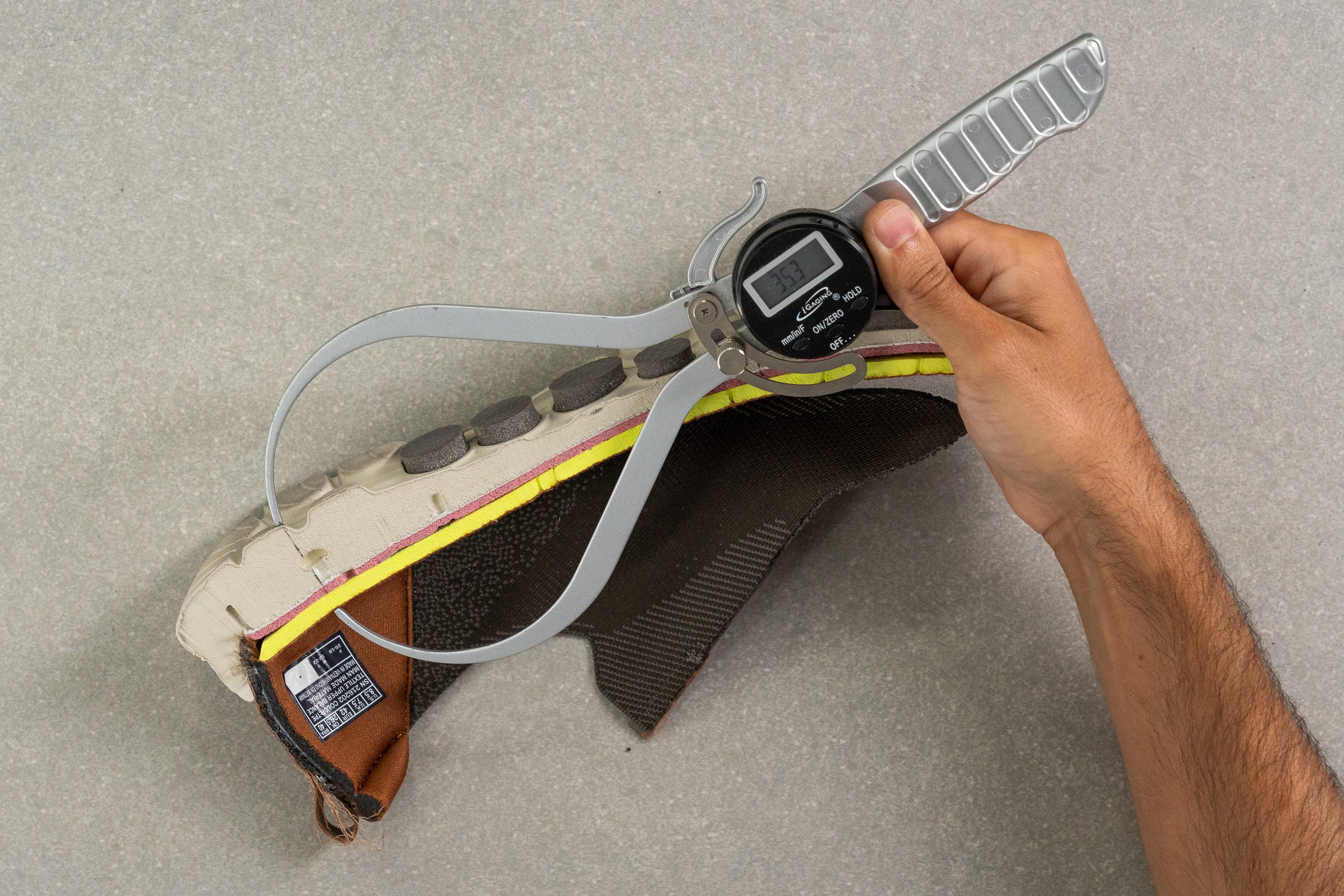
| GO WALK 6 | 35.3 mm |
| Average | 32.3 mm |
Forefoot stack
The forefoot stack measures 22 mm which is a pretty average thickness for this part of a walking shoe.
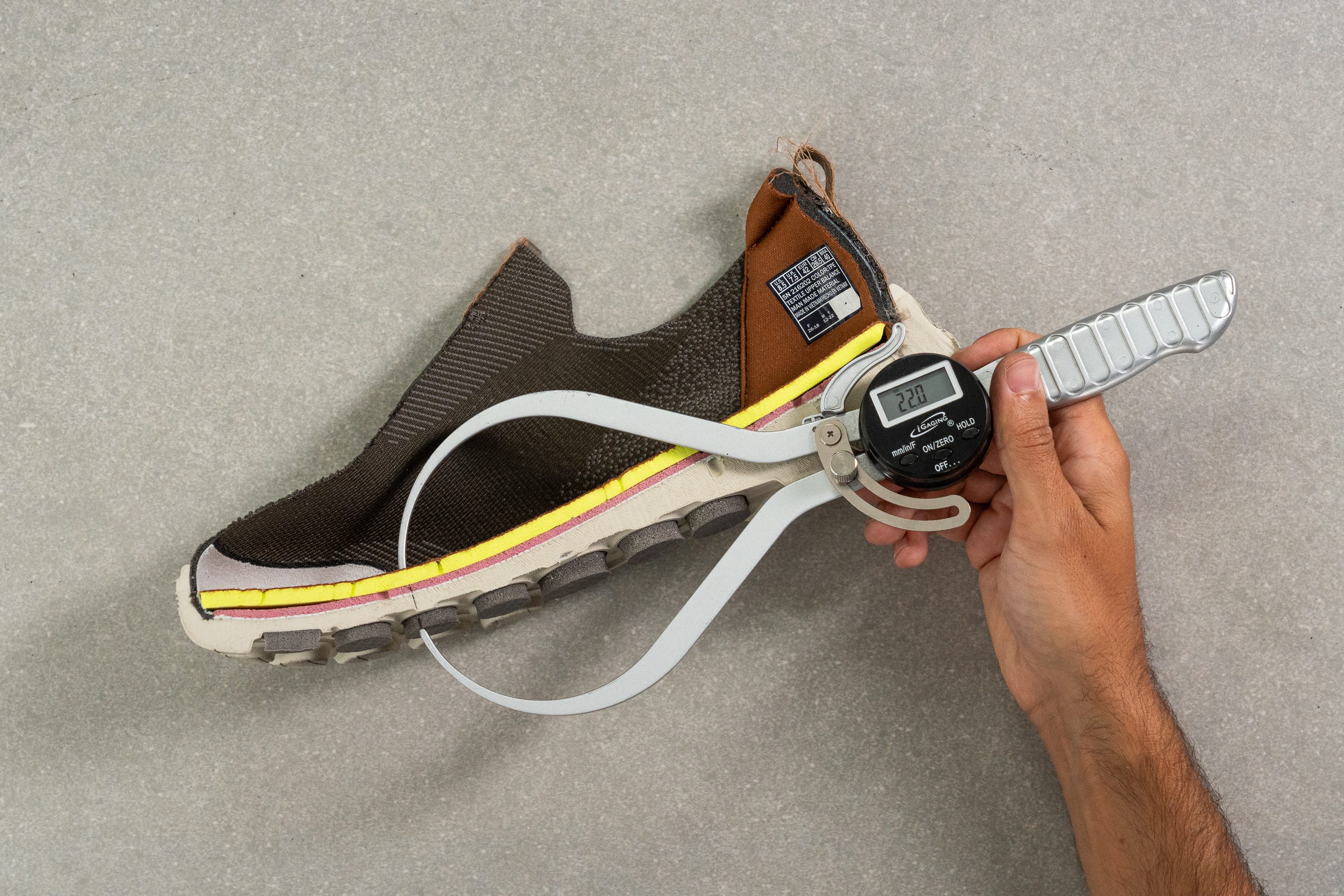
| GO WALK 6 | 22.0 mm |
| Average | 21.9 mm |
Drop
Calculating the difference between the heel and the forefoot, we found the drop to be as high as 13.3 mm! This is a good 3 mm taller than average.
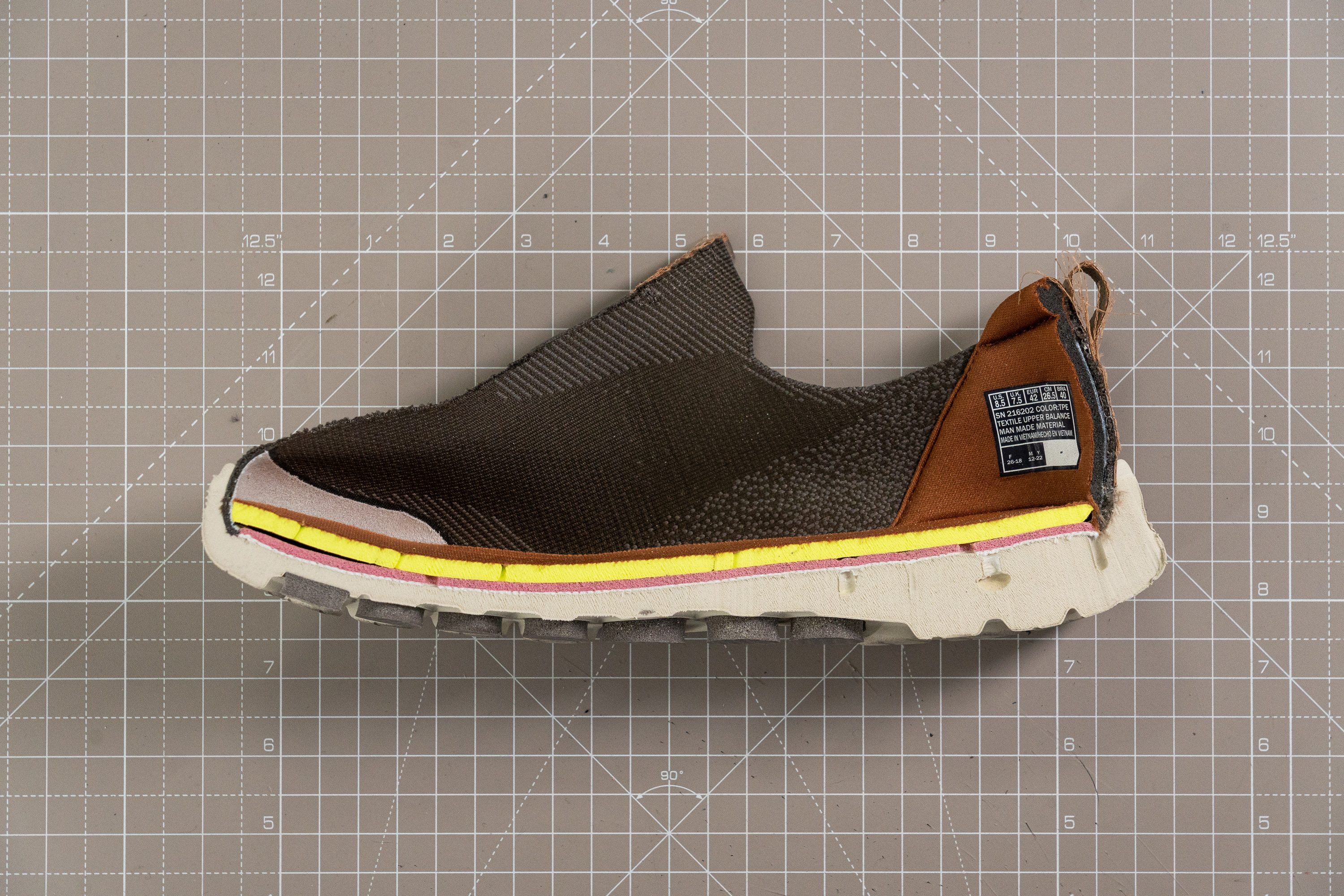
This is great news for people who love extra care for their heels upon landing.
| GO WALK 6 | 13.3 mm |
| Average | 10.4 mm |
Midsole softness
The GOwalk 6 has two sources of cushioning, the primary ULTRA GO foam and the slightly firmer Hyper Pillars running through the middle.
Pressing our durometer against the ULTRA GO foam, we found that it is relatively soft at 24.6 HA.
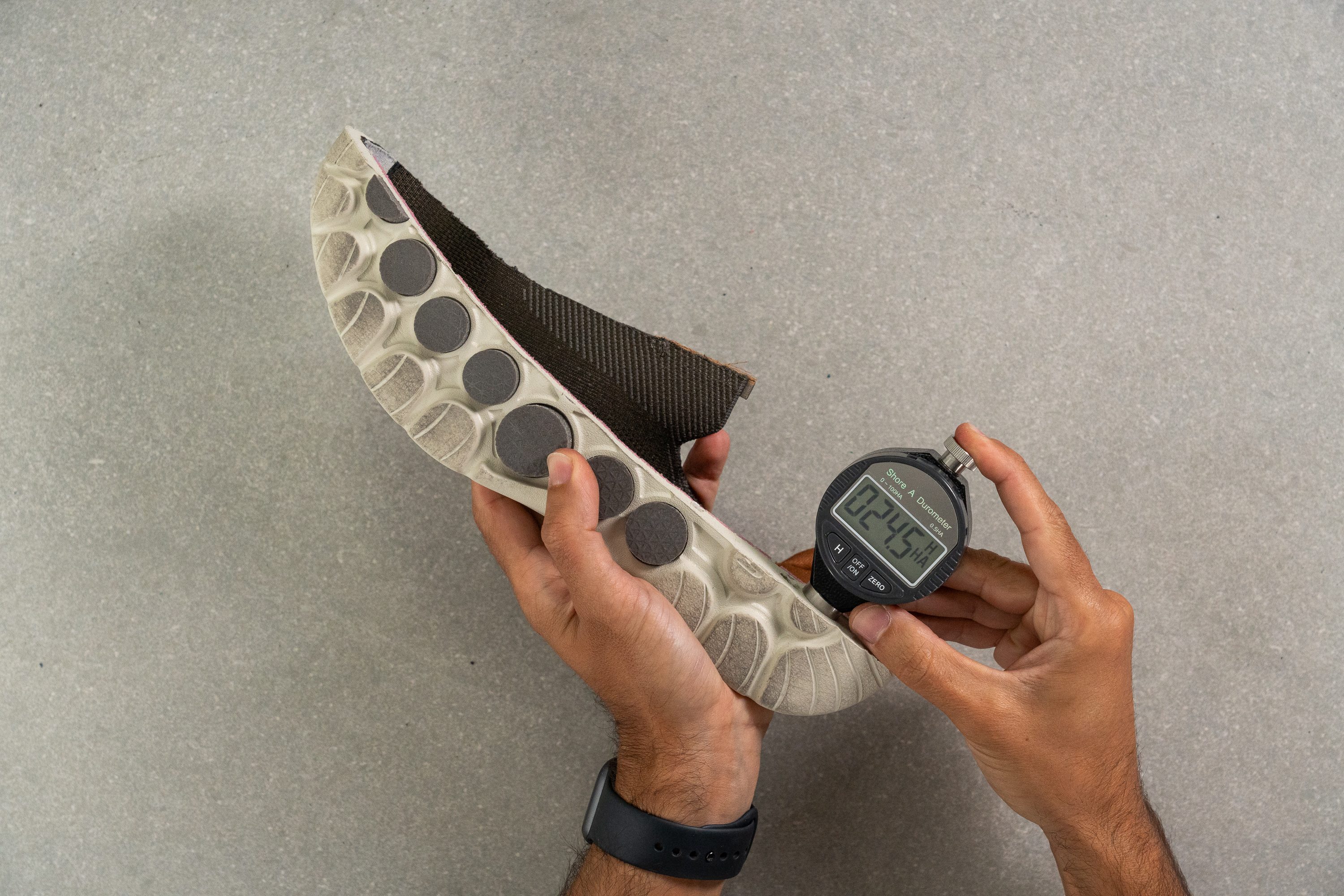
It is 15% softer than the average of other foams but not ultra plush. Cutting back on the squishiness helps this already flexible shoe stay supportive.
| GO WALK 6 | 24.6 HA |
| Average | 26.4 HA |
Secondary foam
The rounded Hyper Pillars also work as stabilisers to keep the gait more steady in this shoe. They are notably firmer than the primary foam. Our durometer shows 33.5 HA which is 36% firmer than the ULTRA GO.
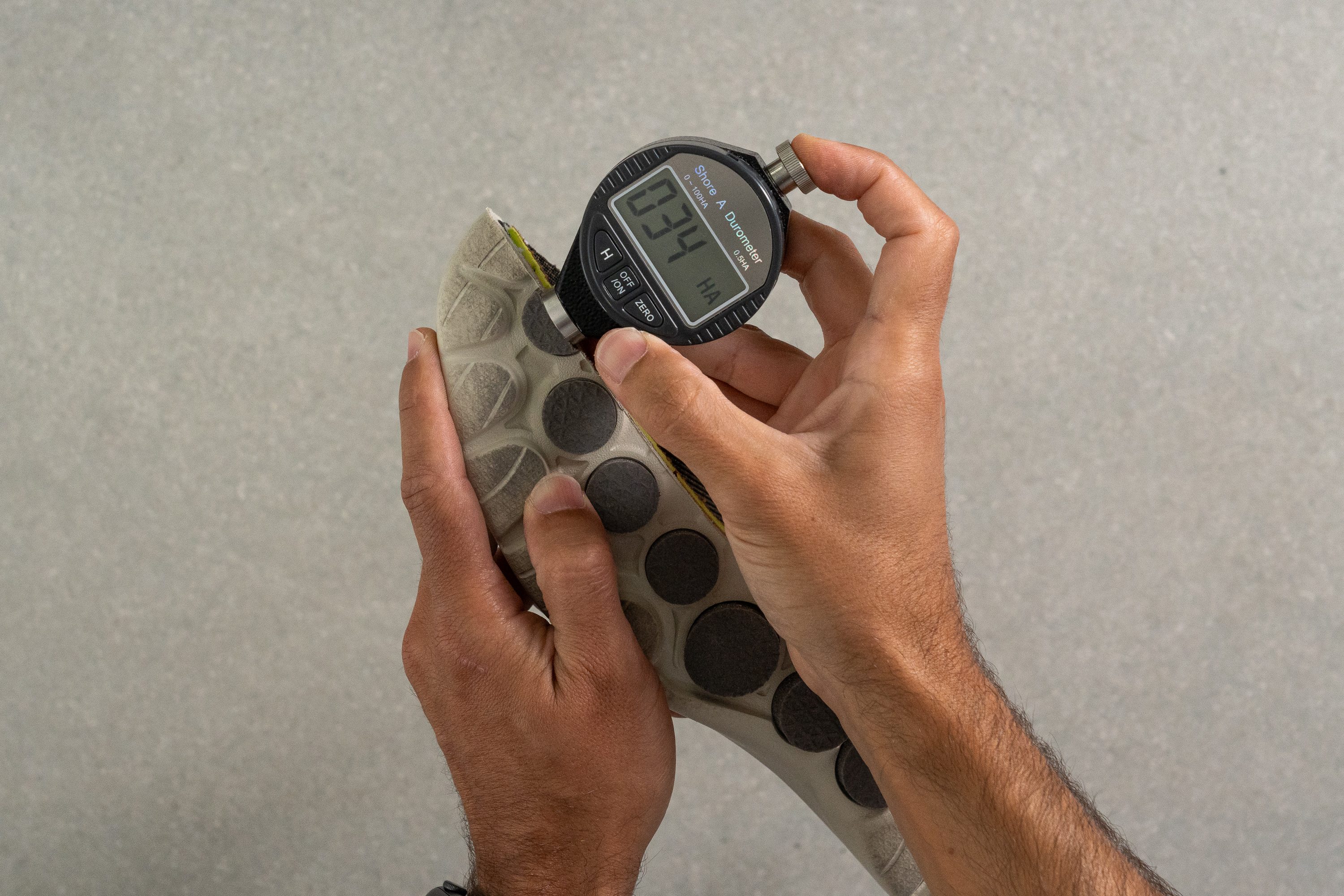
| GO WALK 6 | 33.5 HA |
Size and fit
Size
Skechers GO WALK 6 fits true to size (233 votes).
Toebox width - widest part
At first glance, the GOwalk 6 comes in a pretty narrow profile. But let's not forget that it has a super stretchy upper material. Once you slide your foot inside, the knit adapts to the shape of your foot creating a very snug but cozy sock-like experience.
We also measured the widest part of the toebox at 98 mm which is the same as the average of walking shoes.
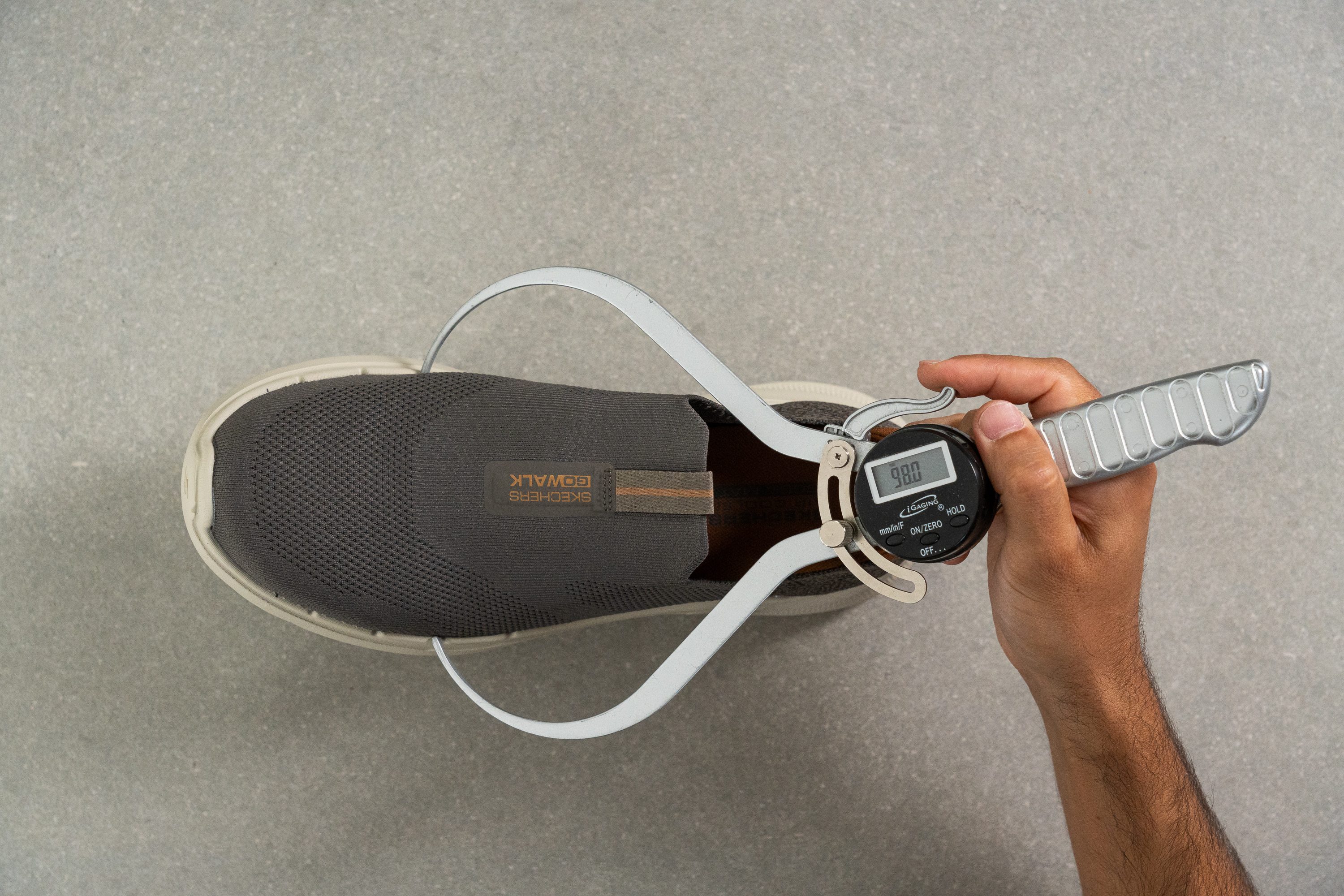
This test follows an older methodology, which is why you don't see recently tested shoes in the chart. Results from different methodologies can not be compared.
| GO WALK 6 | 98.0 mm |
| Average | 99.2 mm |
Toebox width - big toe
The shoe's toebox is more tapered than usual. Measuring its width at the big-toe point, we found that it is only 73.3 mm wide. Being 4.3 mm narrower than average, it probably makes it a no-go for wide feet.
Luckily, this model is available in extra wide, where you can get plenty of space for a higher-volume foot.
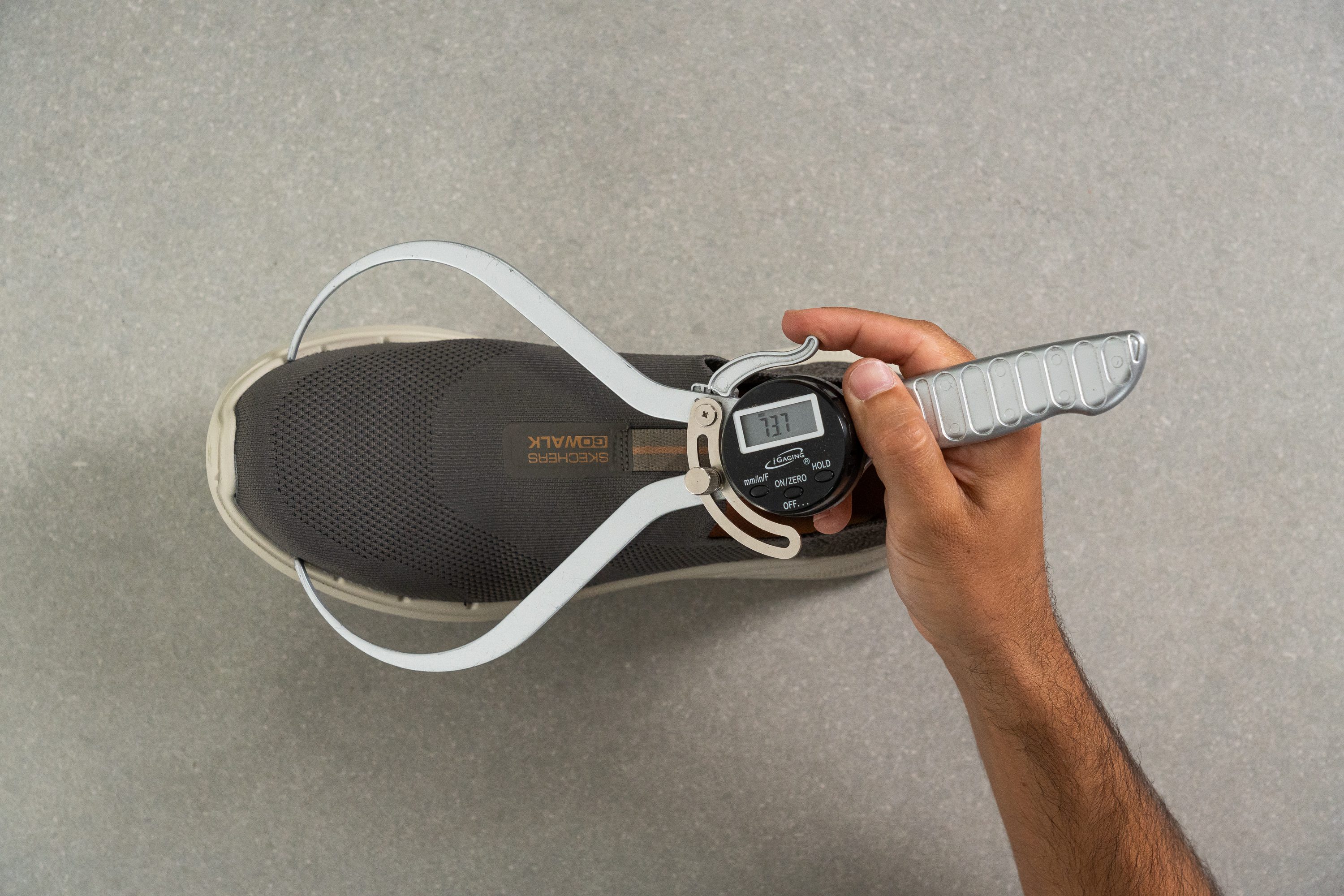
This test follows an older methodology, which is why you don't see recently tested shoes in the chart. Results from different methodologies can not be compared.
| GO WALK 6 | 73.7 mm |
| Average | 78.6 mm |
Traction / Grip
This Skechers has enough traction for walking around city streets on a sunny day. We haven't tested the shoe in harsh conditions but given the lack of a rubber outsole, we wouldn't risk it.
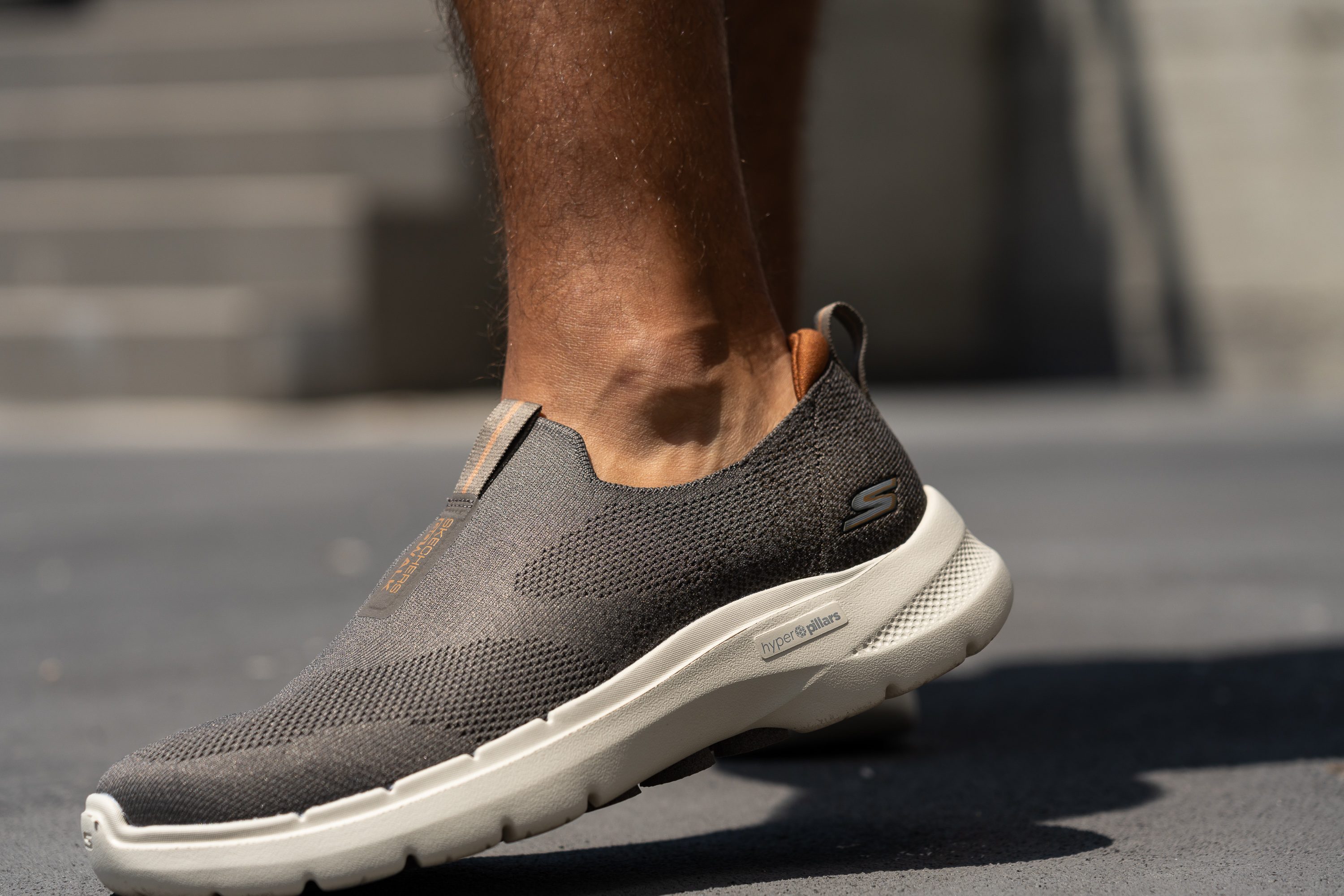
Traction test
Our grip tests confirmed that this Skechers shoe allows you to GO WALK around the city not only on a sunny day but after the rain as well. Its traction is equally effective in both scenarios.
Stomping the shoe's heel against wet concrete, our grip testing machine recorded a good friction score of 0.48. This means that your foot is less likely to slip as you land on the heel when walking in the GO WALK 6.
| GO WALK 6 | 0.48 |
| Average | 0.46 |
Outsole design
The unconventional design of this Skechers shoe's outsole makes it feel like a massaging slipper with all those rounded pods underfoot. But on the flip side, it is extremely vulnerable to premature wear which also results in faster loss of grip.
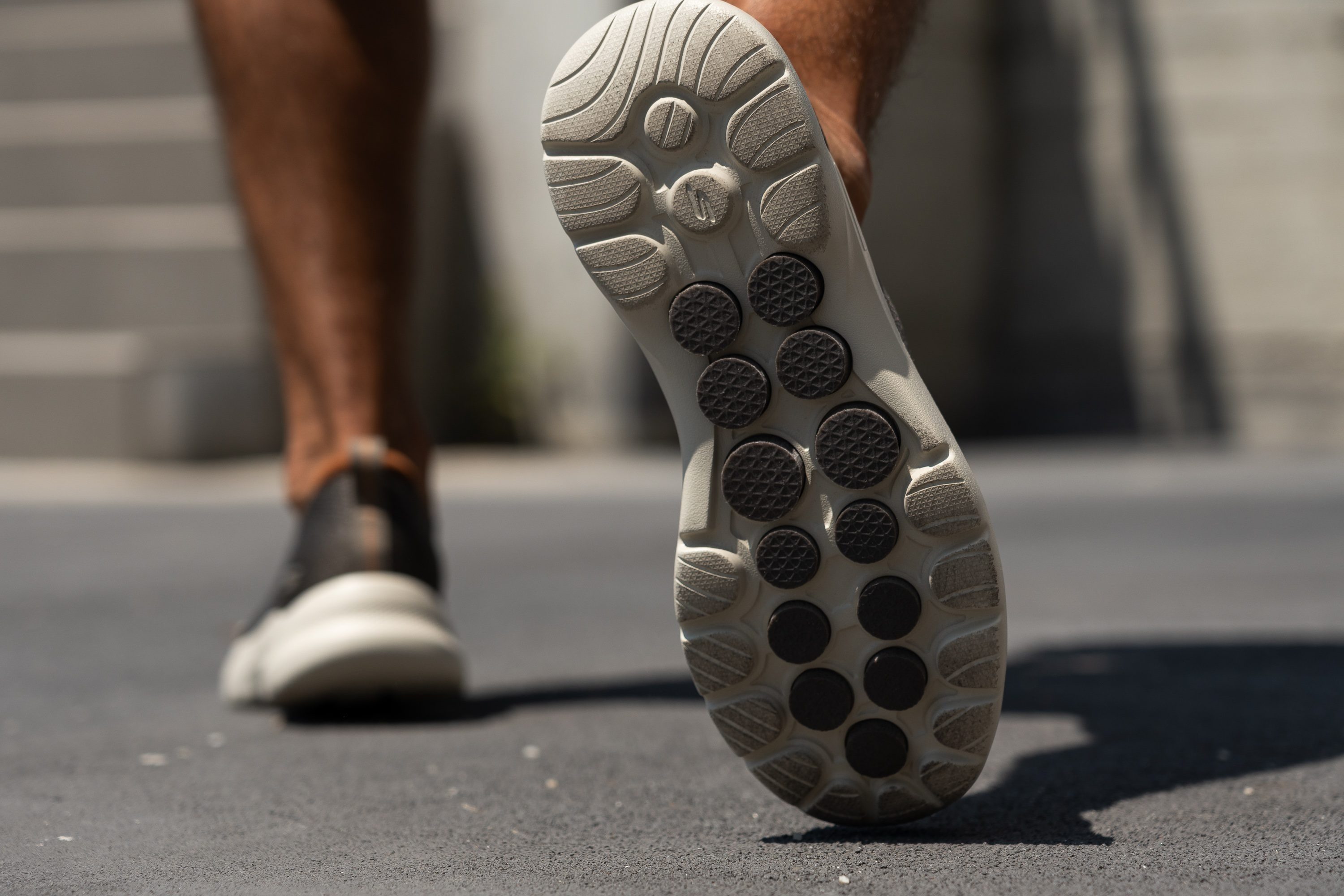
Flexibility / Stiffness
The fact that the GOwalk 6 is one of the most flexible shoes on our list won't be a huge surprise by now.
It took as little as 9.7N of force to bend the shoe to a 30-degree angle which is significantly less than it takes a walking shoe on average! We must admit that this is one of the things that helps this Skechers shoe feel like it's not even there.
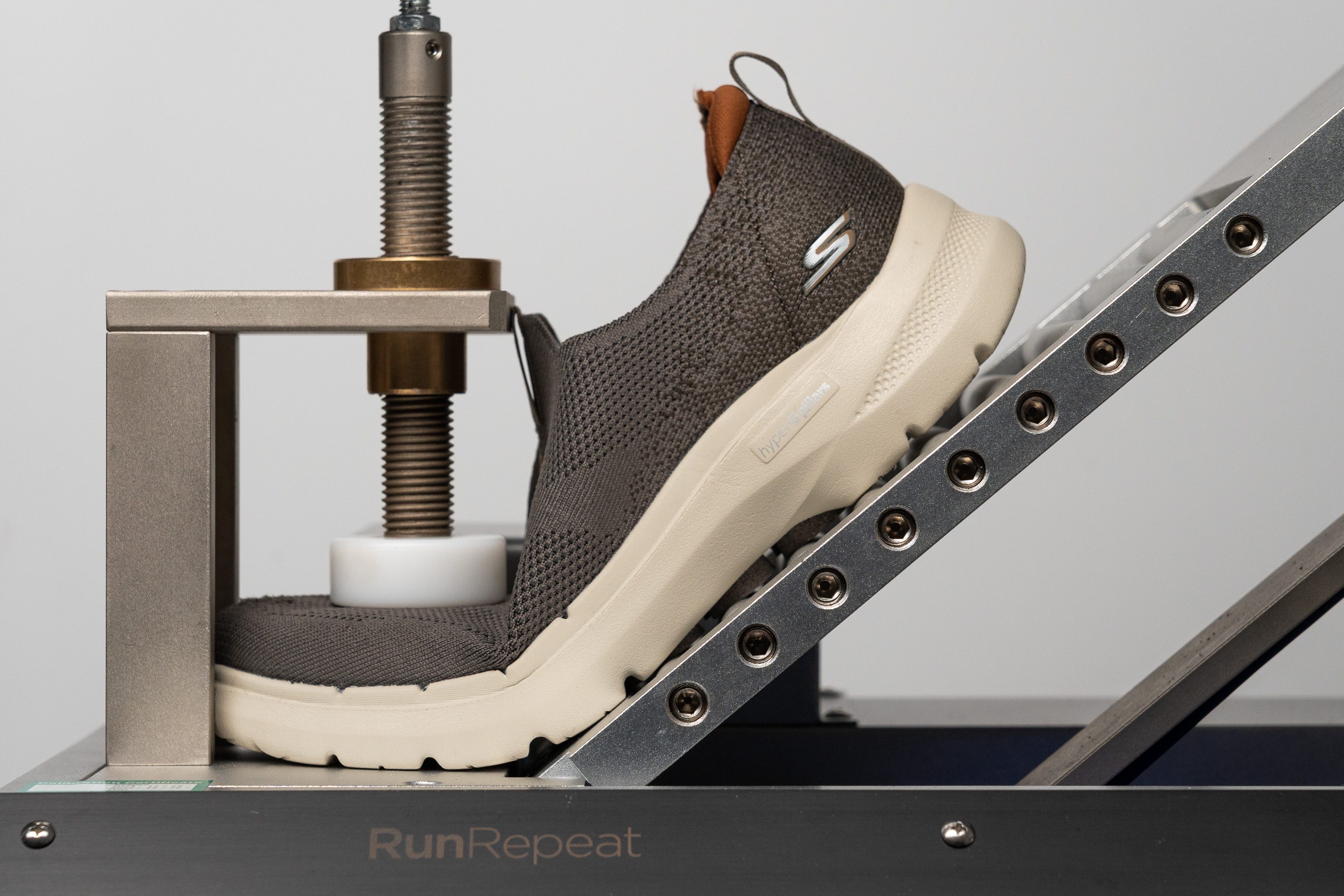
| GO WALK 6 | 9.7N |
| Average | 13.9N |
Weight
The GOwalk 6 from Skechers is one of the lightest walking shoes in our catalogue.
In a men's US size 9, the shoe weighs as little as 8.8 oz (249g). This is lighter than the average by 0.7 oz (21g).
The shoe disappears on the foot!
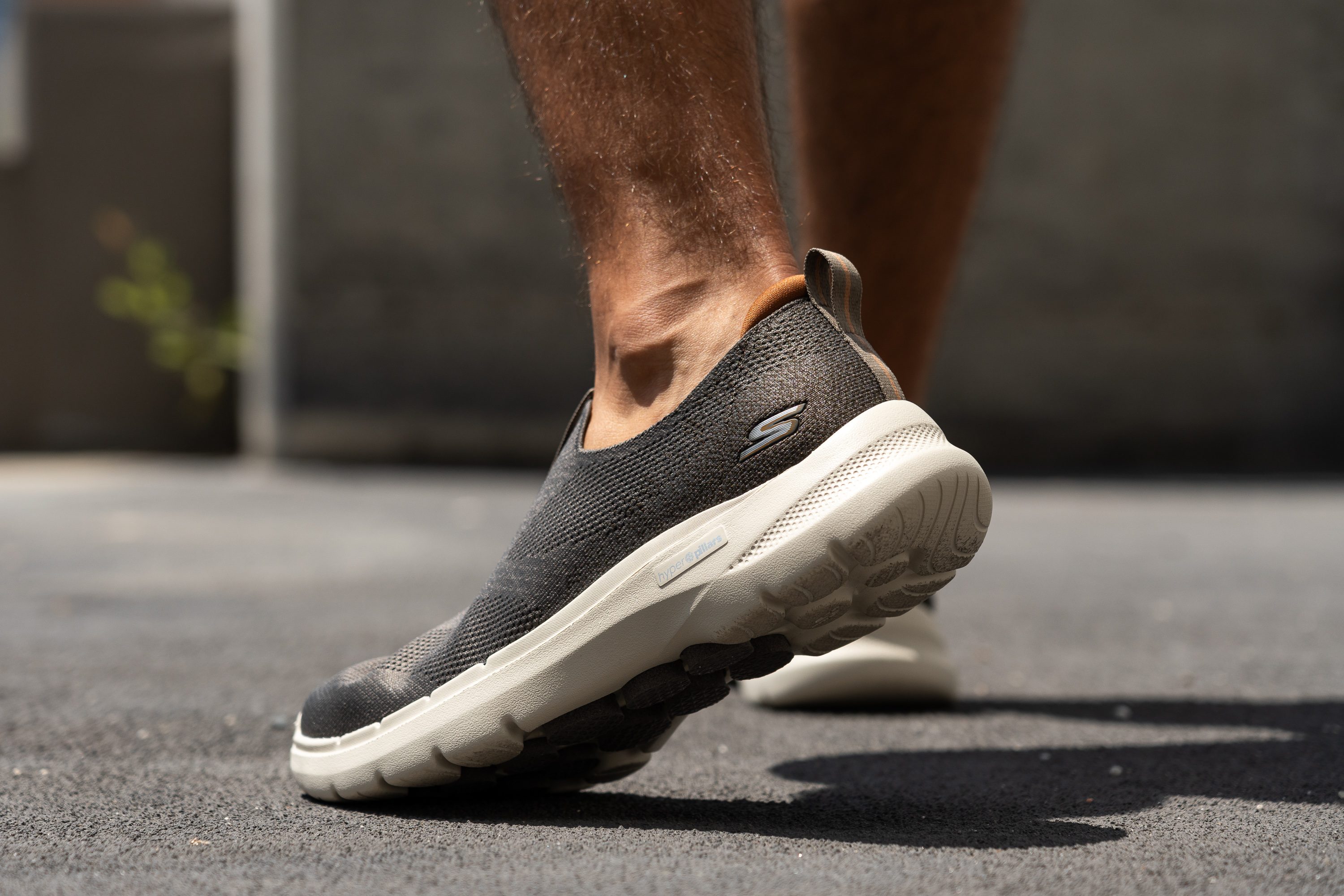
| GO WALK 6 | 8.8 oz (249g) |
| Average | 10.2 oz (288g) |
Breathability
To our surprise, this Skechers shoe didn't do so well in our breathability test. Having pumped smoke through the shoe's upper, we were underwhelmed by the tiny plume coming out on the other side.
We had to rate the breathability of this Skechers shoe as low as 2 out of 5.
It is also obvious from our transparency test below that the shoe's upper has no substantial ventilation holes for the heat to escape.
Looking at the upper textile up close, it becomes even more clear why this Skechers shoe falls short of breathability.
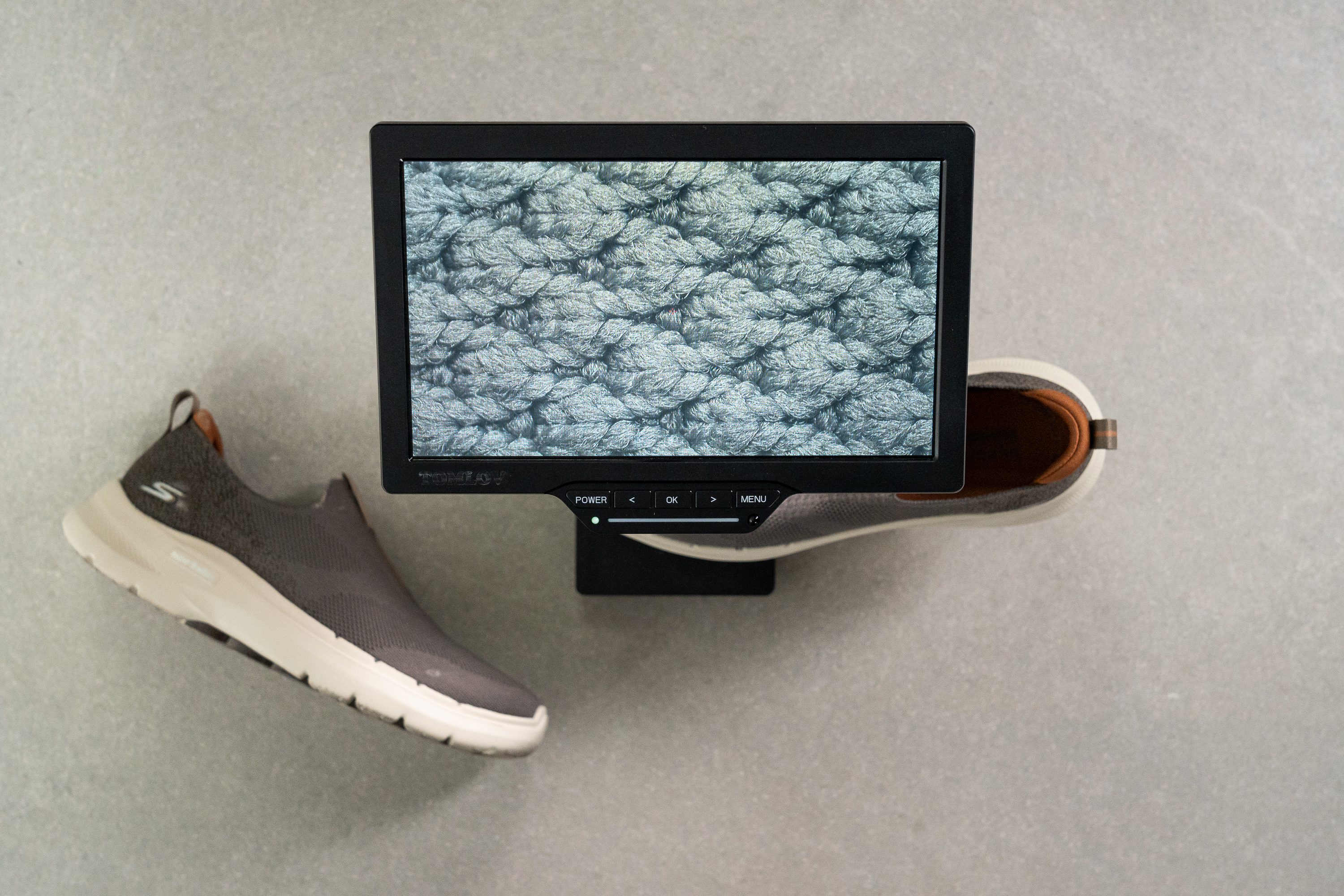
Look how tightly woven the threads are!
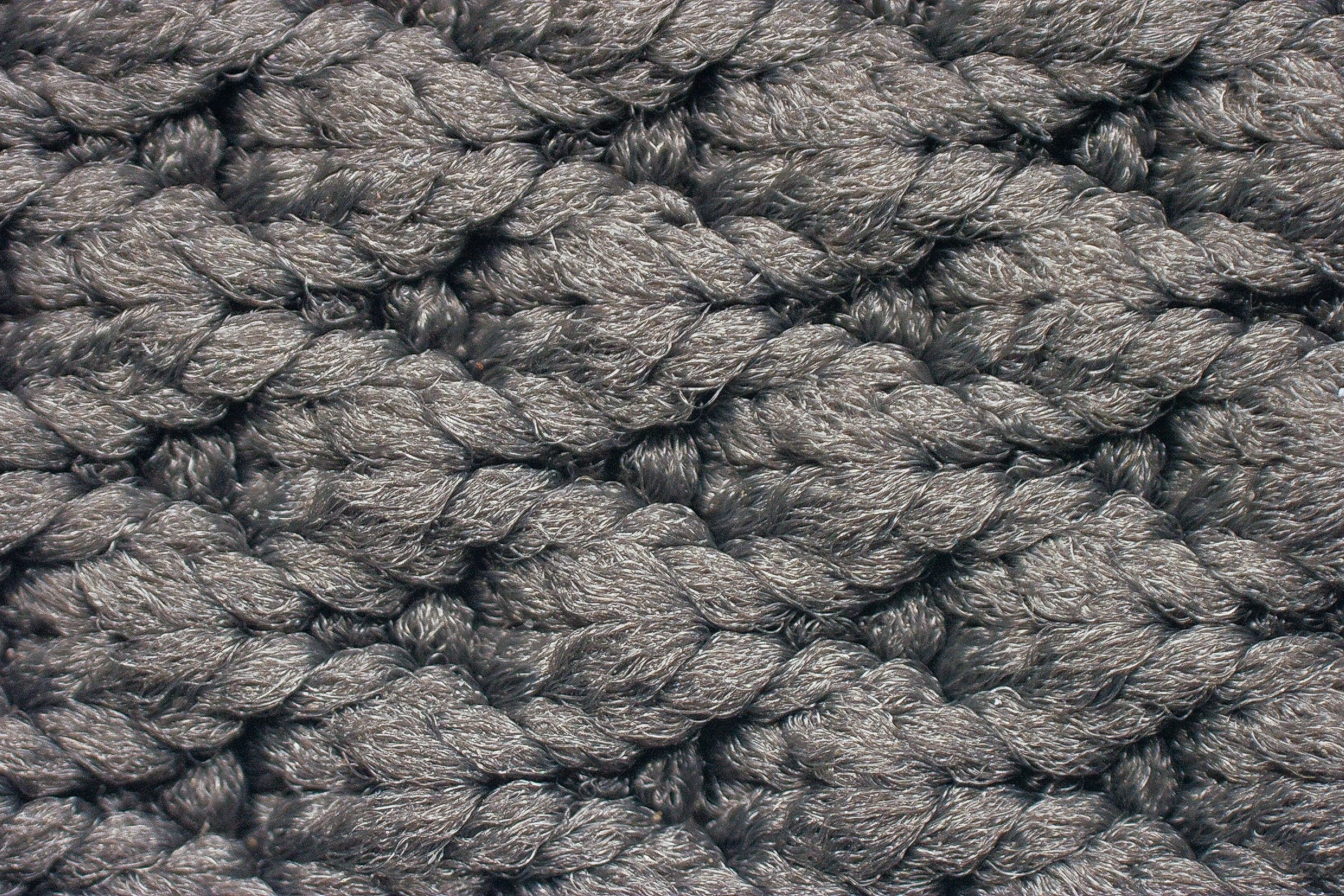
| GO WALK 6 | 2 |
| Average | 2.9 |
Stability
Lateral stability test
As you can probably tell from our wobbly ankle in the video, the GOwalk 6 is NOT the shoe for fallen arches and overpronation. There is nearly zero support in both the sole and the upper.
This is the type of shoe that's meant to mimic the most natural movement of the foot, so it is most suitable for people with neutral pronation.
Torsional rigidity
The shoe is as flexible as it can possibly get. It is meant to work as an extension of your foot and not interfere in any way.
Twisting the shoe in every direction, we assessed its torsional rigidity as 1 out of 5. Even though 0 would probably be a more accurate rating here.
| GO WALK 6 | 1 |
| Average | 2.9 |
Heel counter stiffness
The heel counter stiffness is pretty minimal too. As a result, the heel hold is not only non-intrusive but is also barely felt on the foot (in a good way).
On a 1-5 scale, we rated the stiffness of this area as 2 out of 5.
| GO WALK 6 | 2 |
| Average | 2.4 |
Midsole width - forefoot
Thankfully, the shoe doesn't give up on stability completely. It comes with a pretty wide landing surface to balance out the lack of stability in other areas.
In the widest part of the forefoot, we measured the shoe's platform at 114.5 mm. This is 4 mm wider than walking shoes on average.
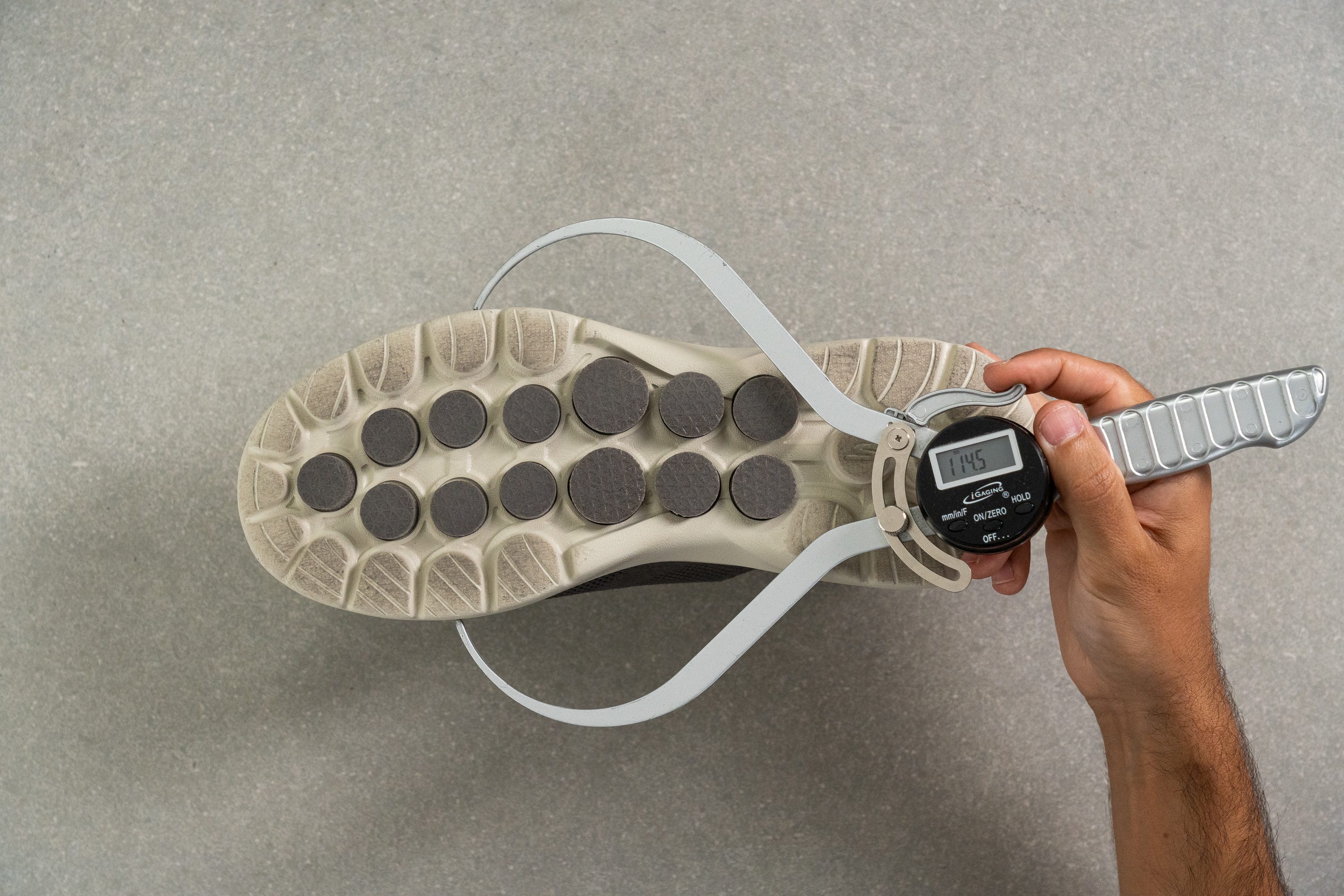
| GO WALK 6 | 114.5 mm |
| Average | 112.0 mm |
Midsole width - heel
We also measured the widest part of the shoe's heel and saw an impressive calliper reading of 93.8 mm. This is 6 mm wider than average.
Having a wider area to land on is a bonus for feeling surefooted.
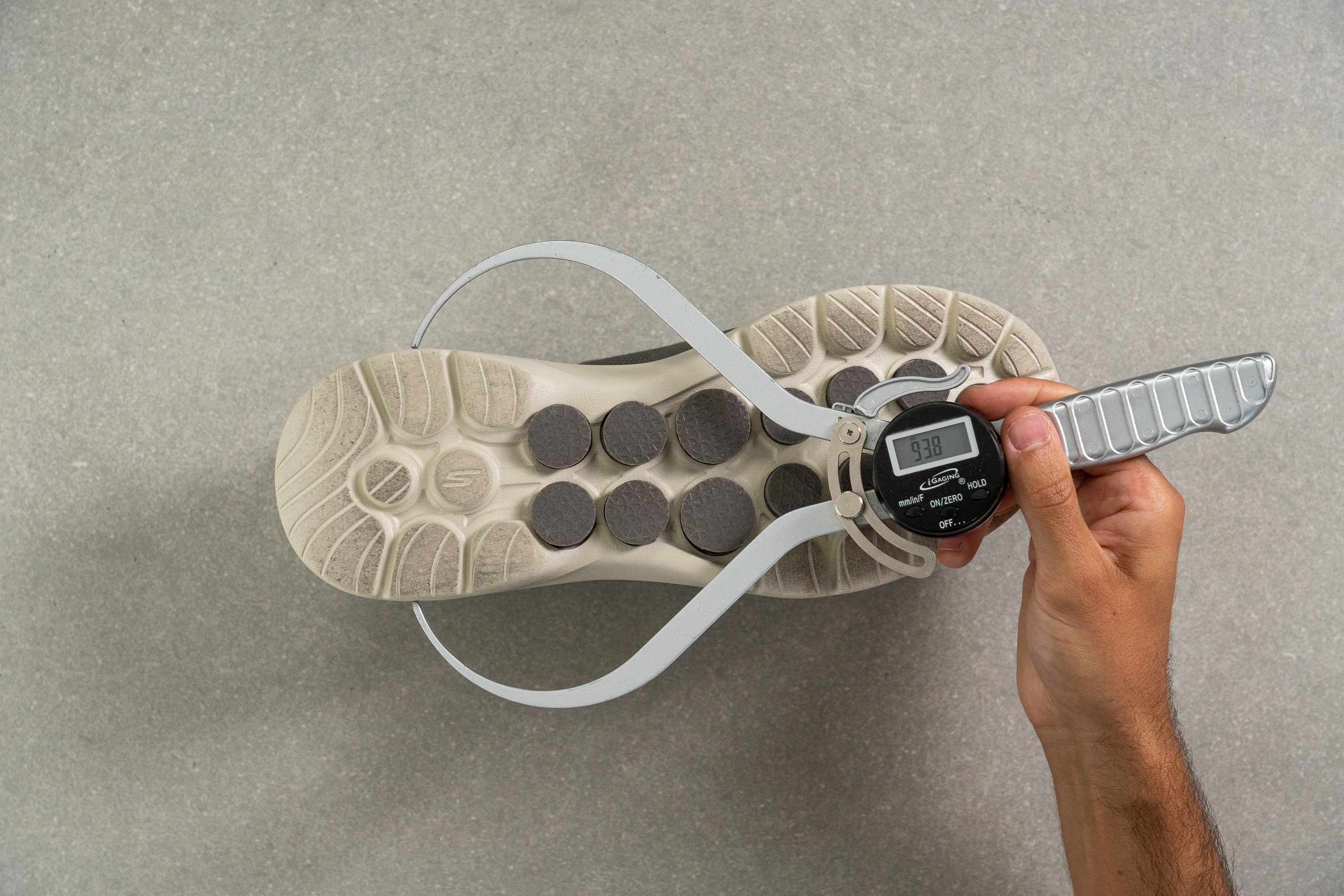
| GO WALK 6 | 93.8 mm |
| Average | 90.3 mm |
Durability
Toebox durability
For a soft knit shoe, the GOwalk 6 shows phenomenal durability that is comparable to synthetic uppers!
To test its wear resistance, we applied a Dremel for 4 seconds at a speed of 10K RPM. But the tool never went through the material completely. This earned the shoe's toebox durability a solid 4 out of 5.
Skechers sets a great example of how a soft upper can still be durable at a price of only £90! We've seen more than a few £150 On Cloud shoes completely torn apart by the same Dremel test.
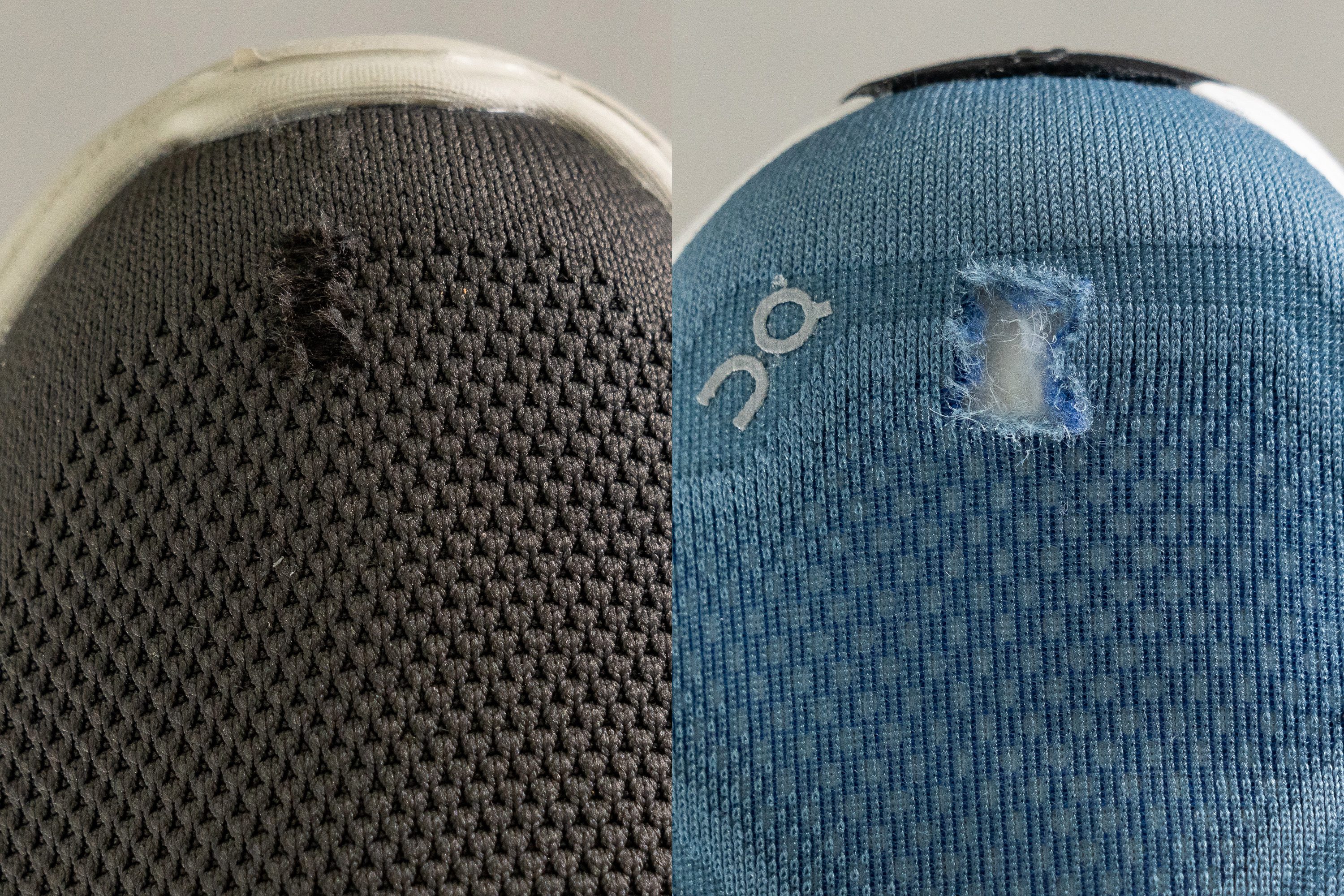
| GO WALK 6 | 4 |
| Average | 3.2 |
Heel padding durability
The heel padding on the other hand showed a less promising level of durability.
Under the exact same conditions, this area got significantly more damaged. But to the shoe's defence, it is a pretty sensitive area for all walking shoes that we've tested.
A low score of 1 out of 5 was to be expected.
| GO WALK 6 | 1 |
| Average | 2.3 |
Outsole hardness
Because there is no rubber outsole per se, we measured the hardness of the foam at the bottom, we got 50.1 HC. Expectedly, this is 51% softer than the average. And soft always means more prone to abrasion.
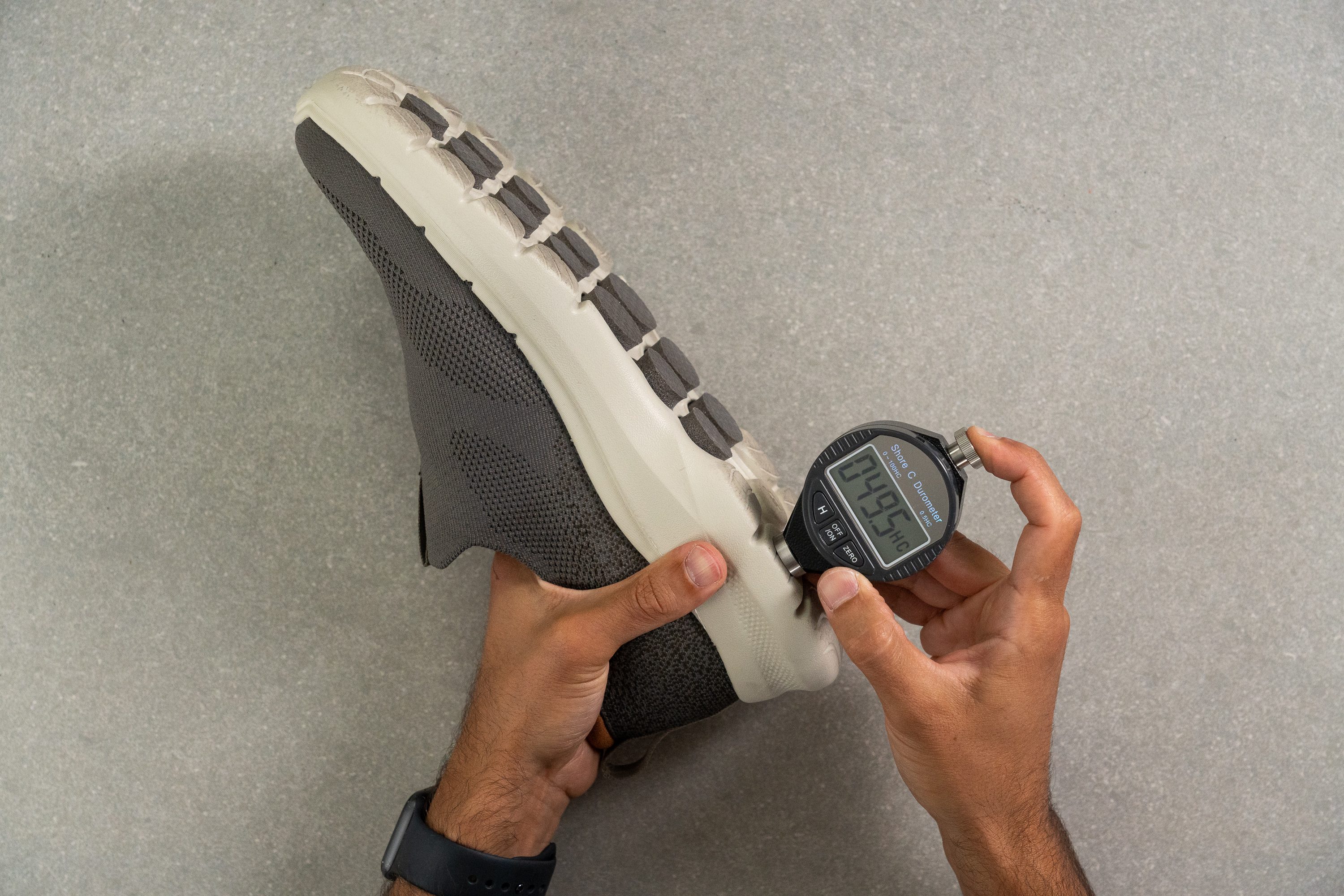
| GO WALK 6 | 50.1 HC |
| Average | 78.0 HC |
Outsole durability
Of course, our Dremel went through the shoe's exposed foam like a knife cuts through butter.
Using a tread gauge to measure the depth of the damage, we found it to be a whopping 3.1 mm deep! For reference, the average ranges from 1 to 1.5 mm.
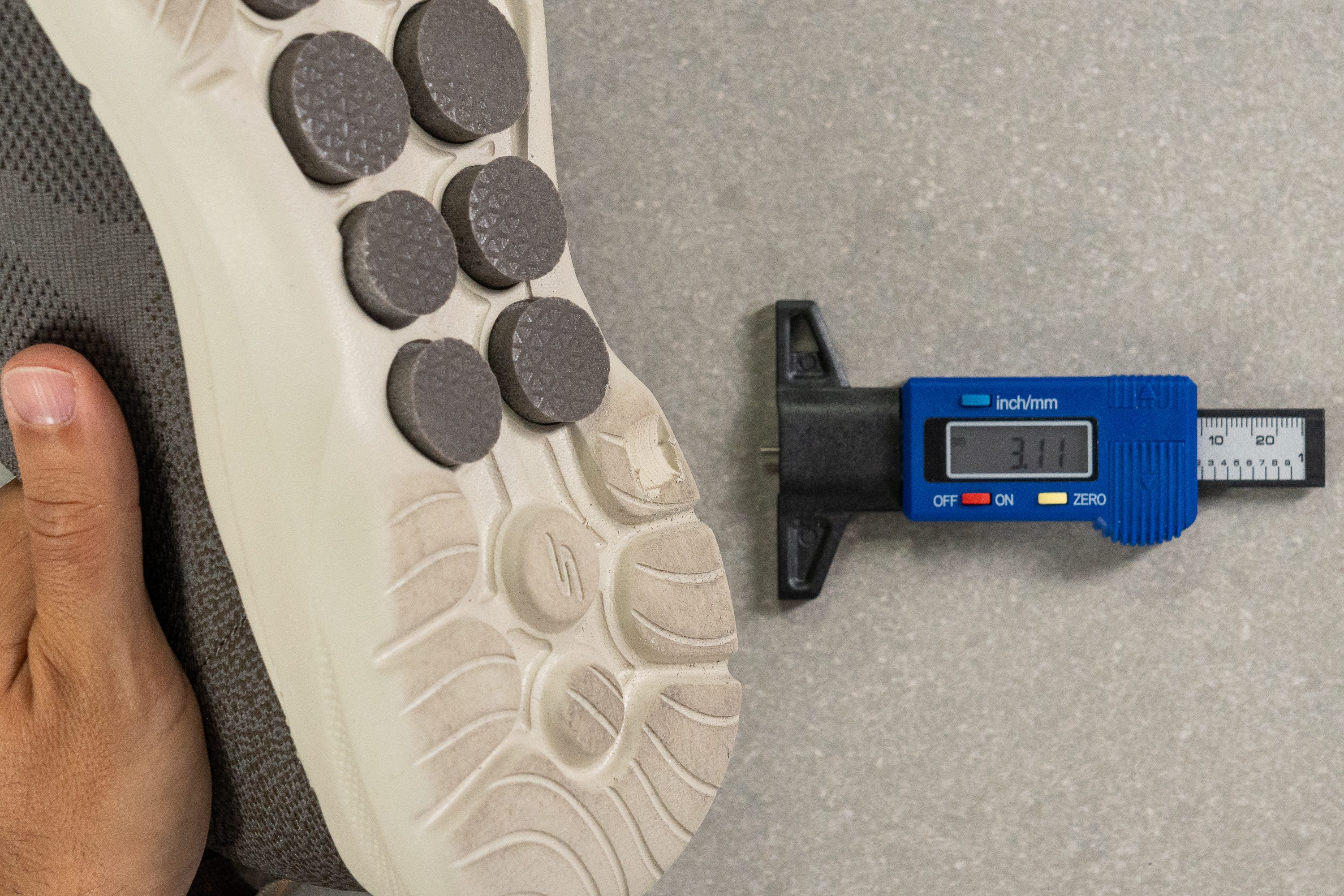
For that reason, we don't expect this shoe to last more than one season. If you are okay with renewing your Skechers pair after a few months, that's fine. And if you want to invest in a more durable walking shoe, consider the On Cloud 5.
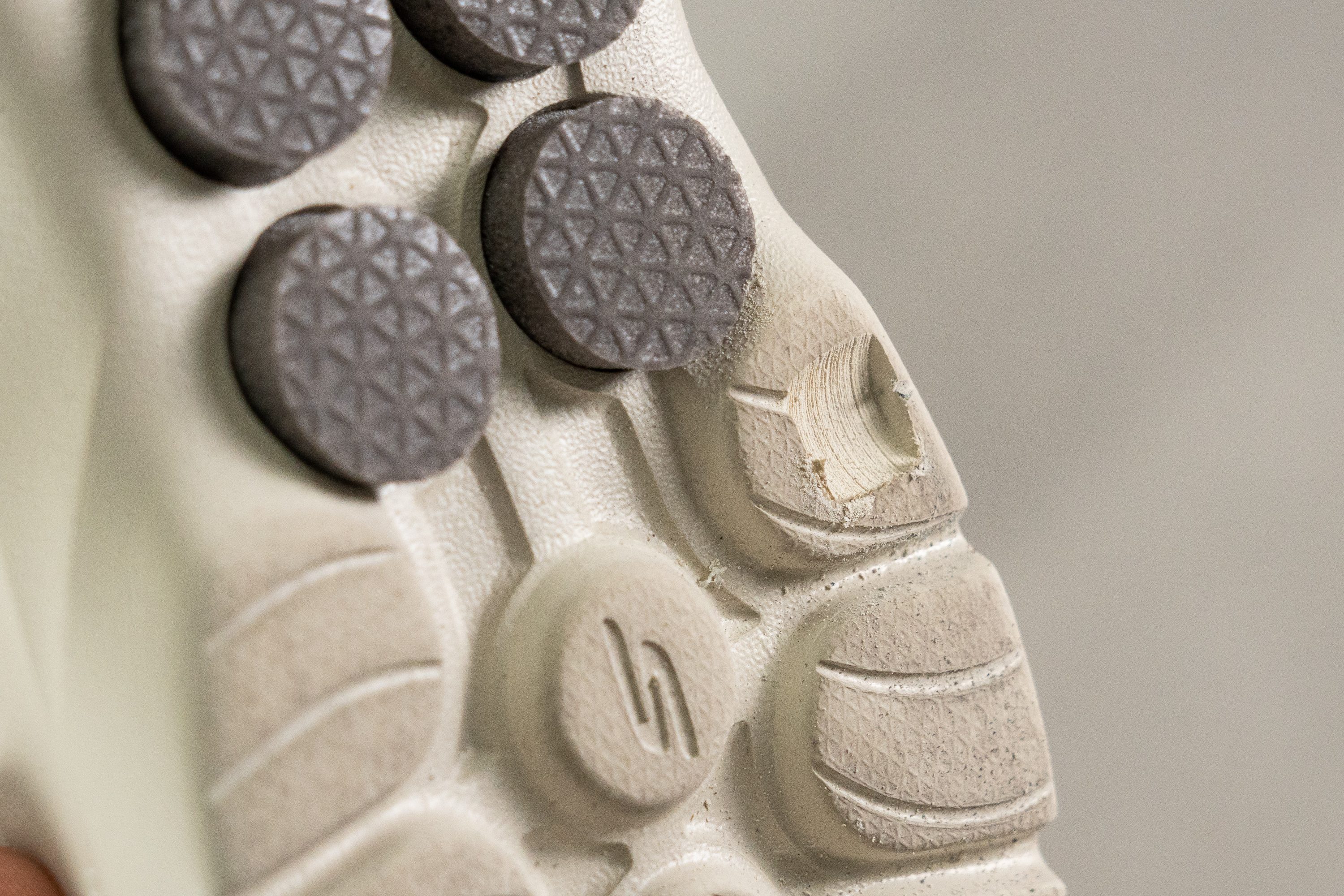
| GO WALK 6 | 3.1 mm |
| Average | 1.4 mm |
Outsole thickness
To keep the weight down, this Skechers shoe was given no rubber outsole for protection (0.0 mm). This leaves us with exposed foam to deal with harsh concrete pavements.
| GO WALK 6 | 0.0 mm |
| Average | 3.0 mm |
Misc
Insole thickness
The Ortholite insole adds a sweet layer of underfoot padding to complement the main cushioning. We measured its thickness at 5.5 mm which is pretty standard for a walking shoe insole.
The insole is also made breathable to compensate for the lack of aeration in the upper. It helps the heat escape through ventilation chinks in the sole.
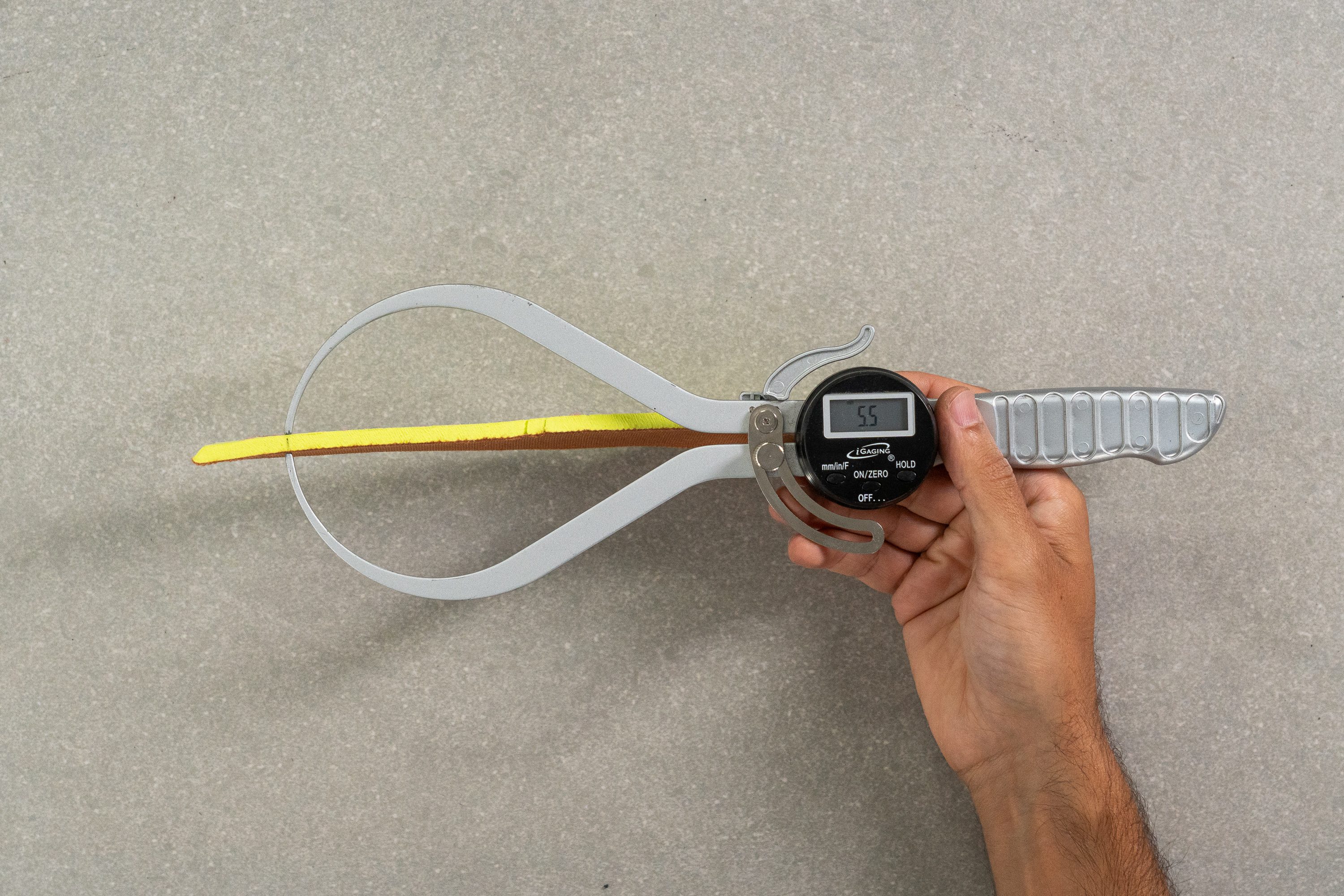
| GO WALK 6 | 5.5 mm |
| Average | 5.8 mm |
Removable insole
If you need more in-shoe space or would like to wear your own orthotics with the shoe, the insole can be easily removed.
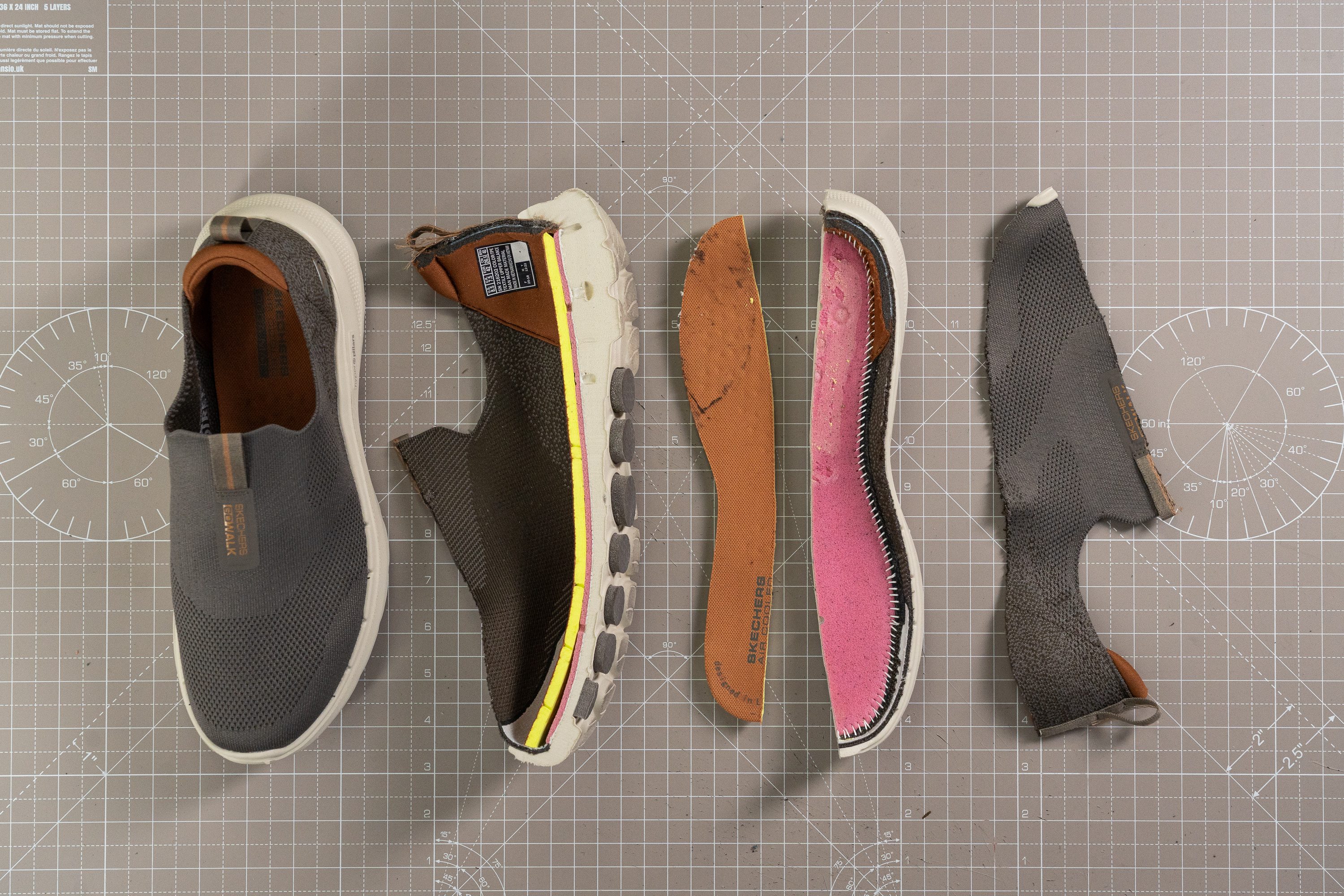
| GO WALK 6 | Yes |
Midsole softness in cold (%)
It was really amazing to find out that the ULTRA GO foam of this Skechers shoe doesn't get much firmer in the cold!
Having kept the shoe in our freezer for 20 minutes and repeating the durometer measurement, we got a reading of 29.6 HA. This is a whole 29% softer compared to other "frozen foams!"
Paired with its warm upper, looks like this walking shoe can remain a nice companion going into the colder autumn months.
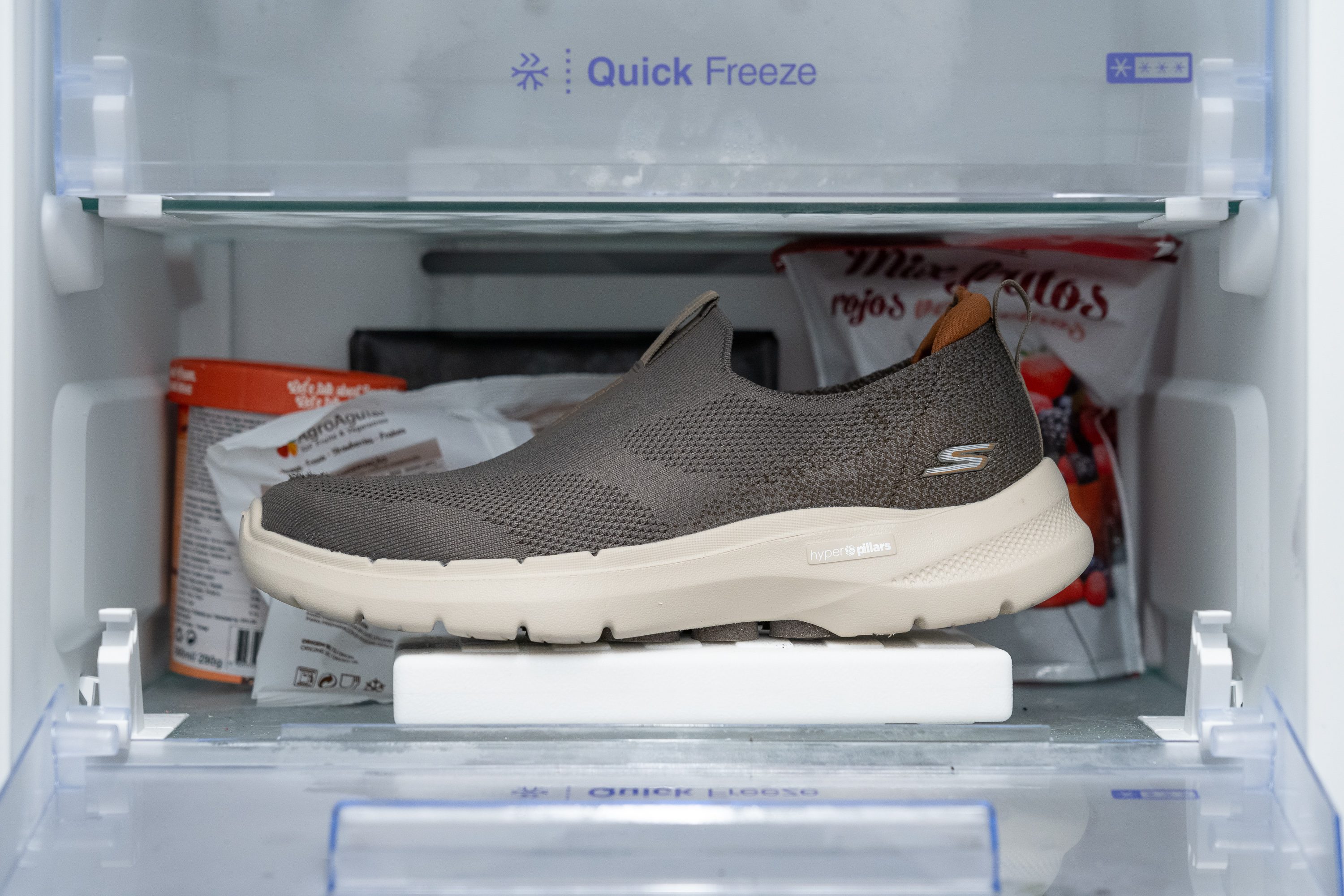
| GO WALK 6 | 20% |
| Average | 30% |
Tongue padding
The shoe has no tongue as such. But to give you a better understanding of what it feels like inside the GOwalk 6, we measured the thickness of the material at 2 mm. There is also no padding inside the shoe, except for a tiny bit of foam around the heel.
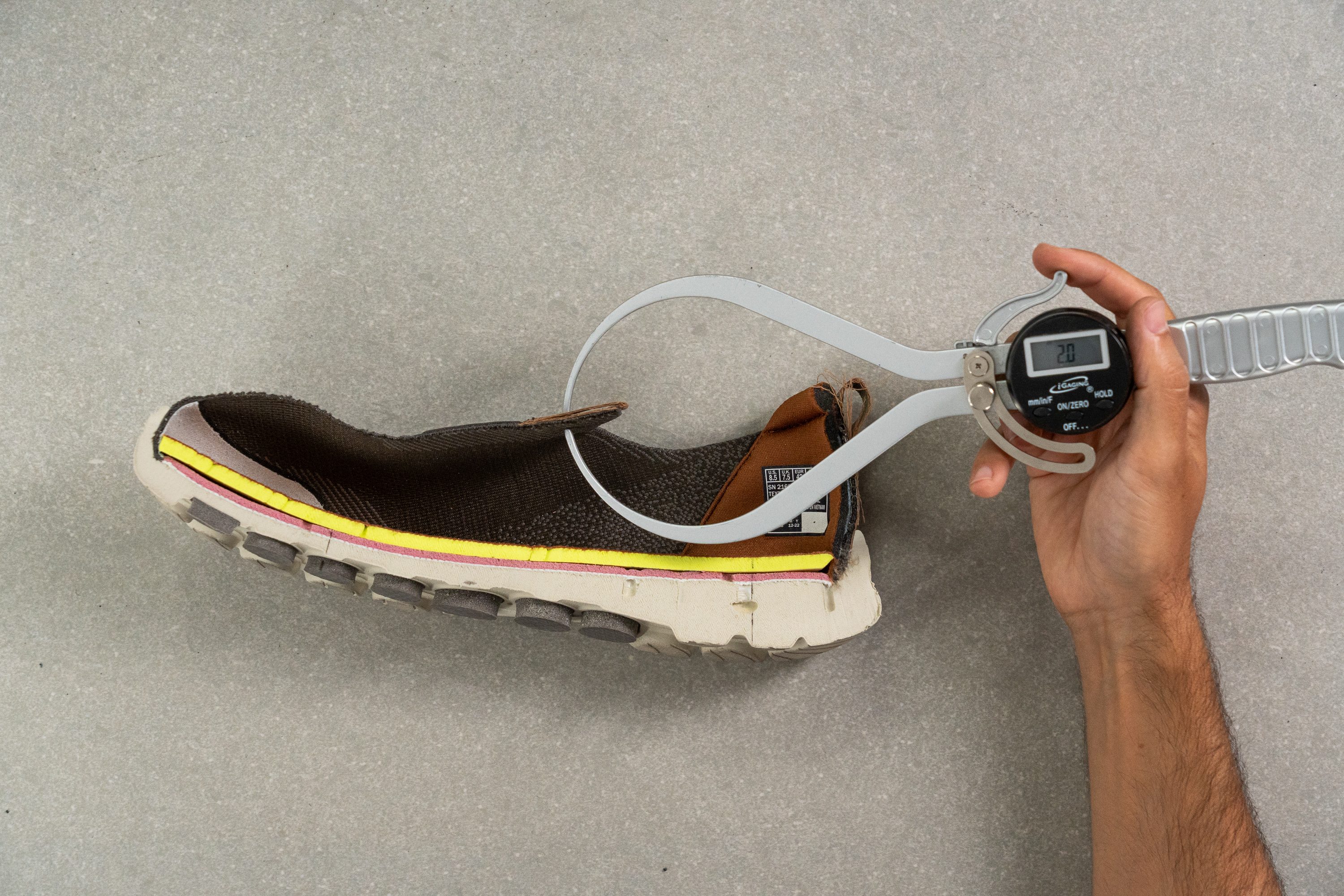
| GO WALK 6 | 2.0 mm |
| Average | 5.6 mm |
Tongue: gusset type
The shoe's upper comes in a one-piece slip-on design.
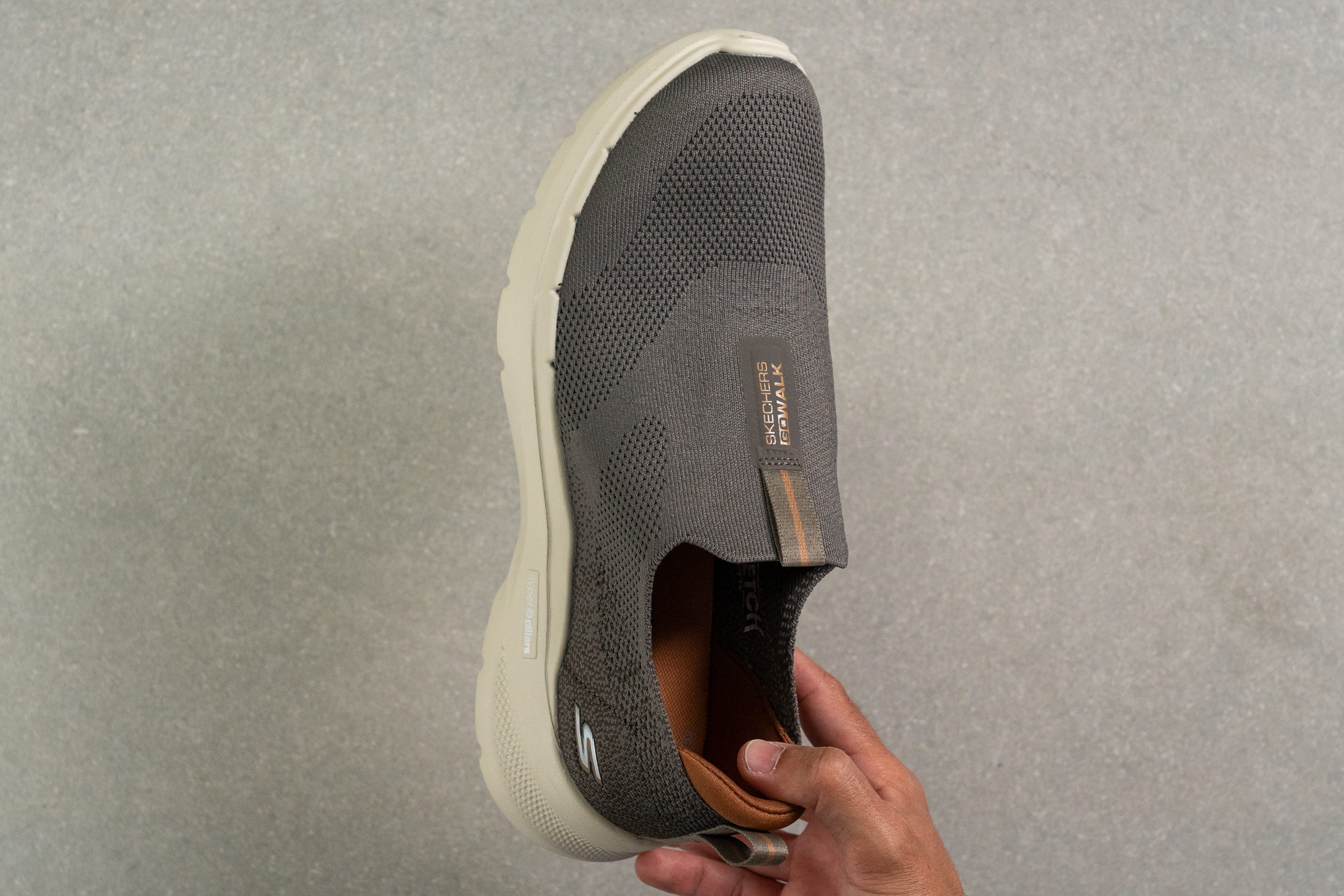
Its soft knit textile wraps around comfortably around the floor and ankle. We haven't experienced any hot spots or blistering in this Skechers shoe, even on day one.
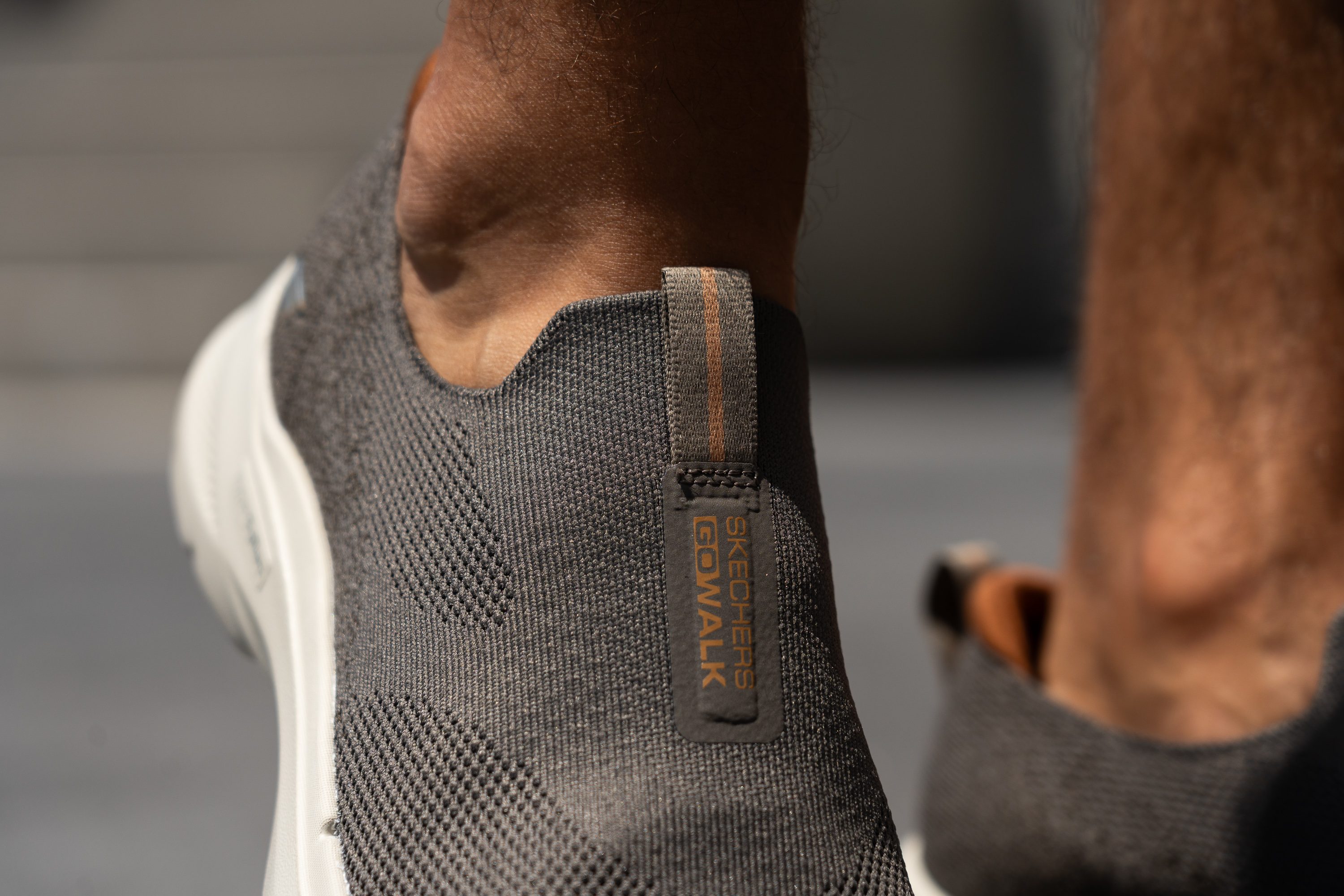
| GO WALK 6 | Sock like |
Heel tab
The finger loop helps to glide into this slip-on shoe even quicker.
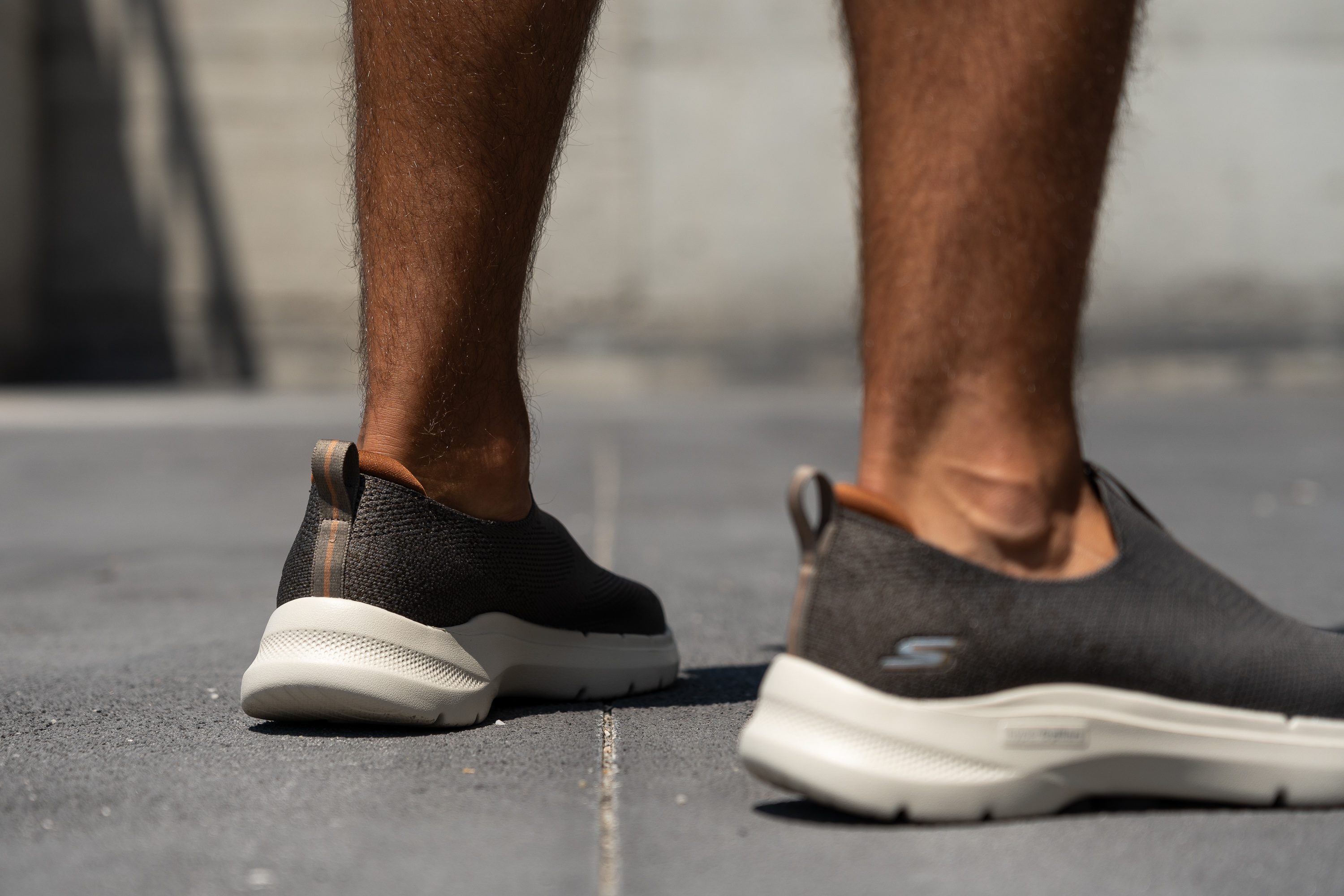
| GO WALK 6 | Finger loop |

